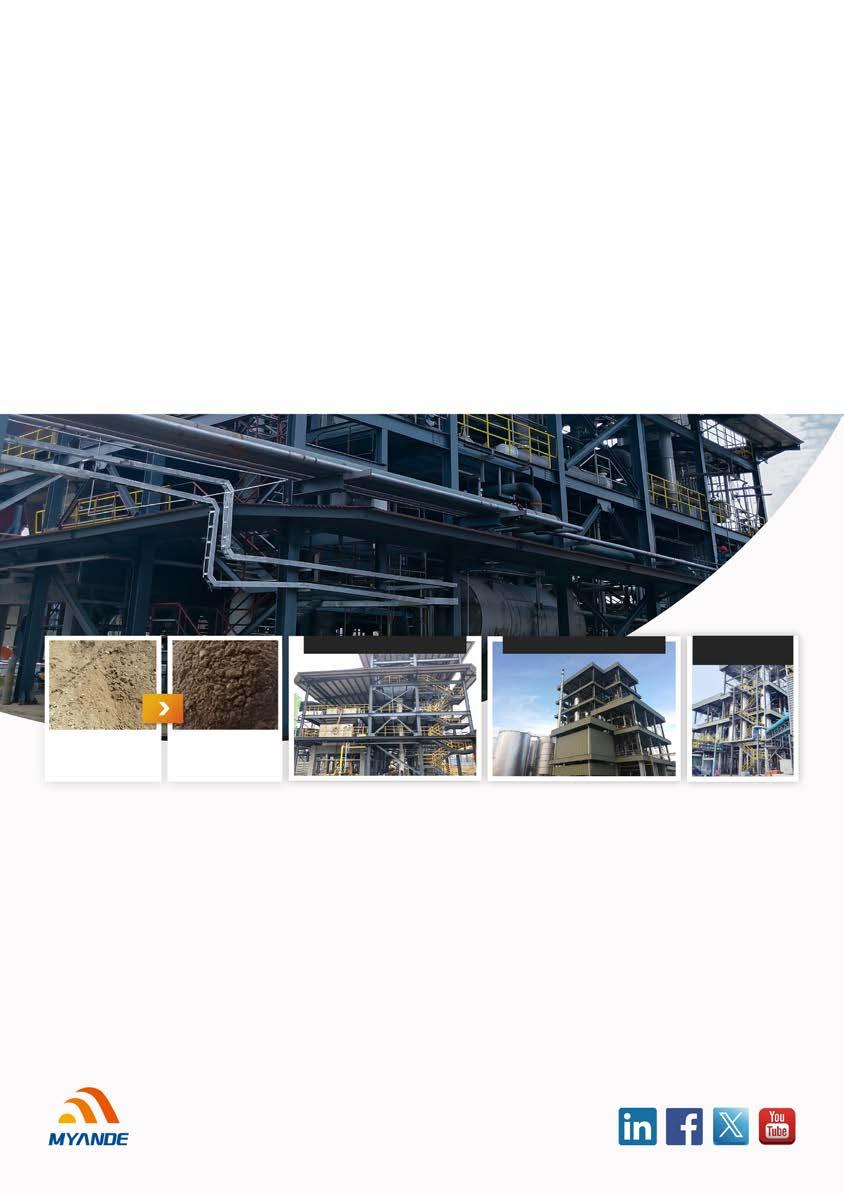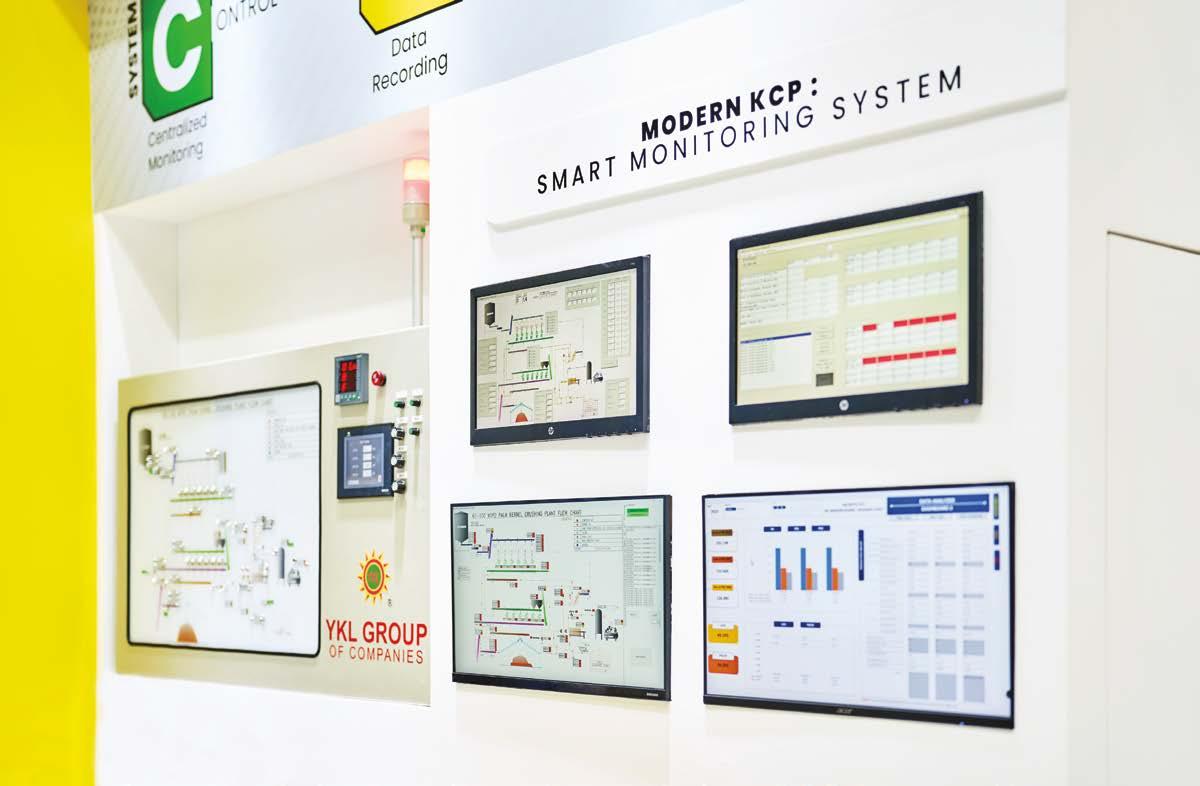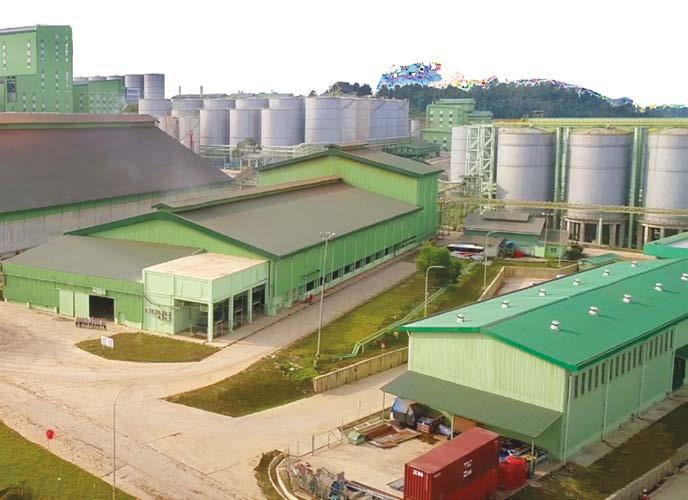

Adopt More
Inclusive, Fair Treatment on Palm Oil Exports, PM Anwar Tells Germany
Independent Smallholders Can Form Larger Clusters to Bolster Malaysia’s Palm Oil Output: Johari Ghani

EU Palm Oil Ban: Malaysia, Indonesia Seek Trade Justice

Special Insight
Nigeria Spends N430bn Annually to Import Palm Oil


image source:
HSS Industrial Products Sdn Bhd
Vol. 13. No. 1, Apr-Jun 2024


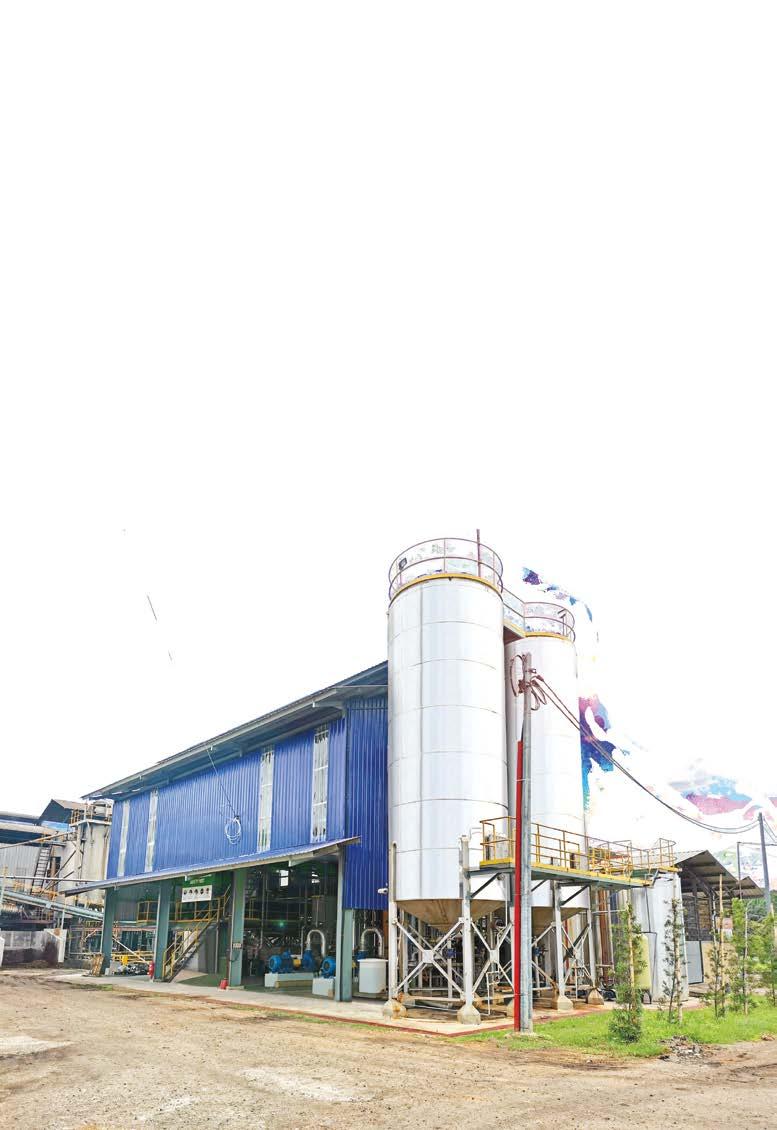
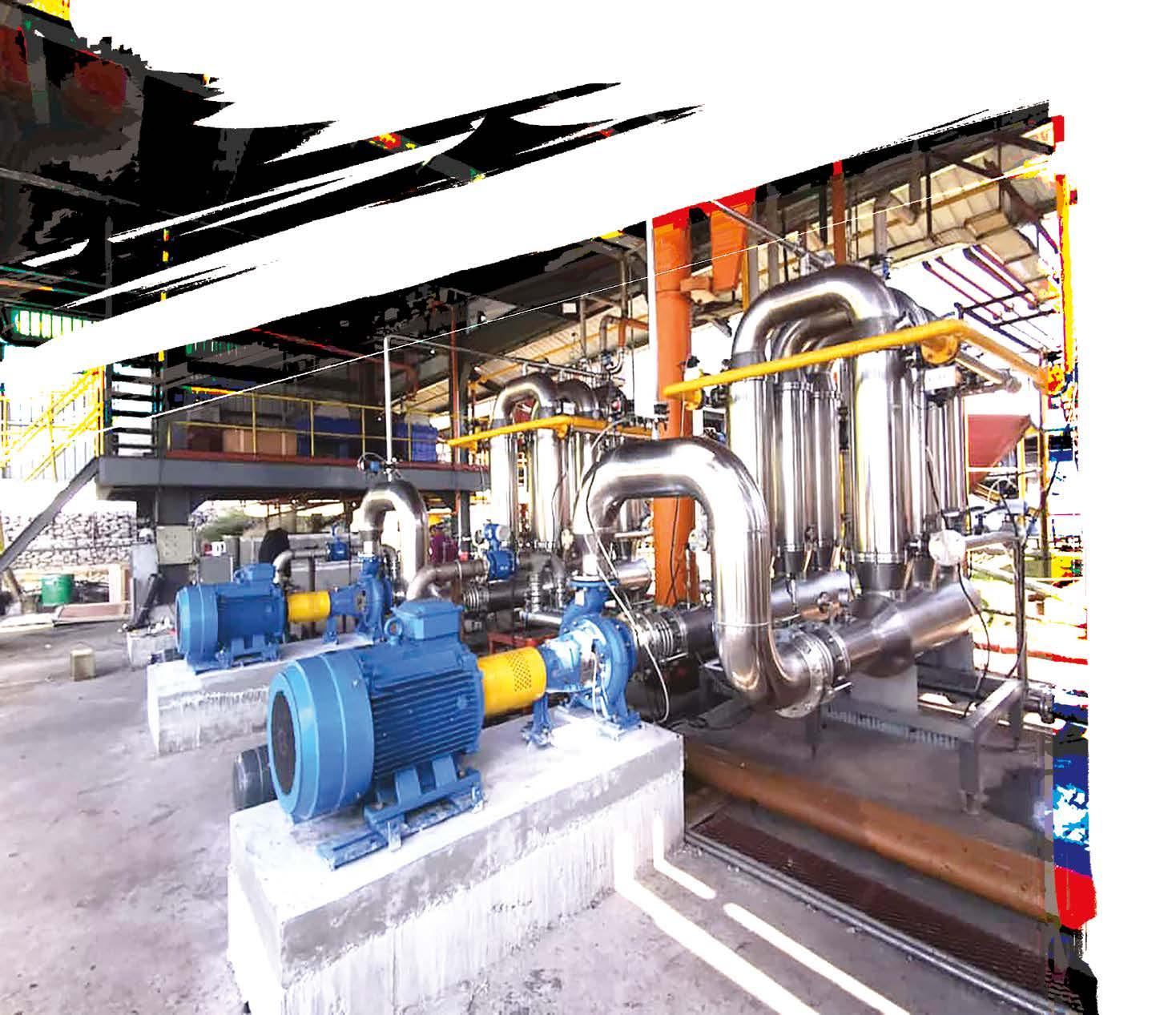


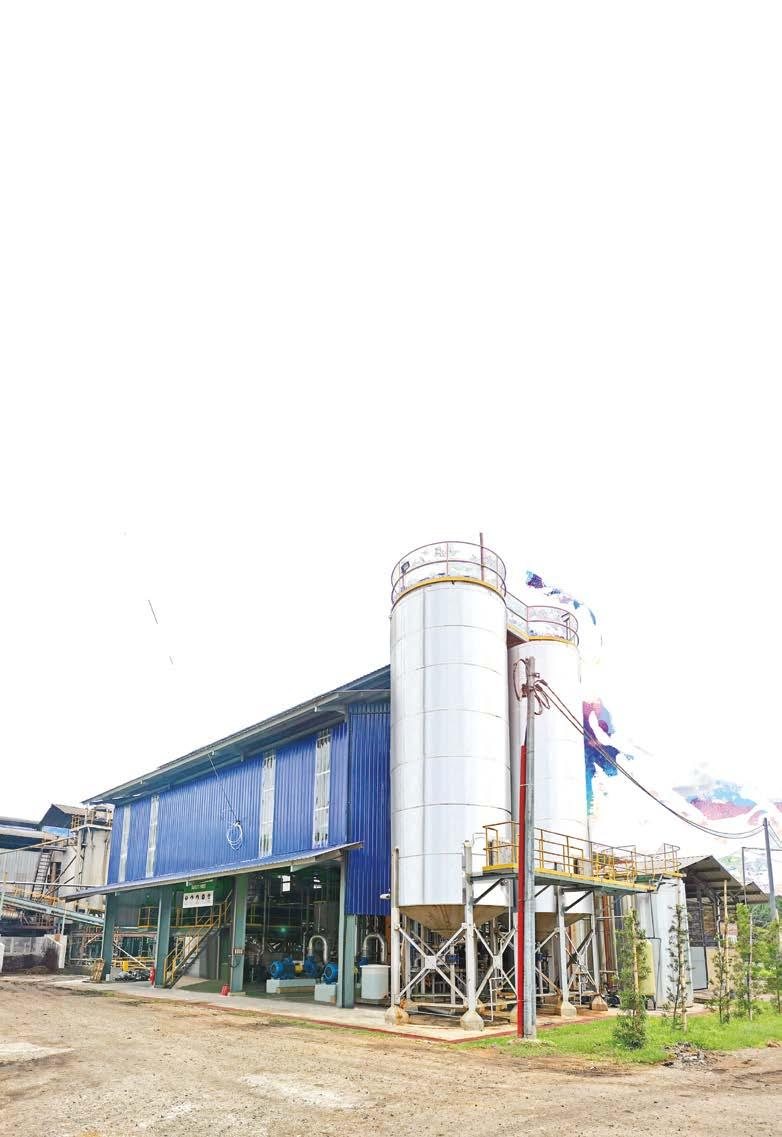
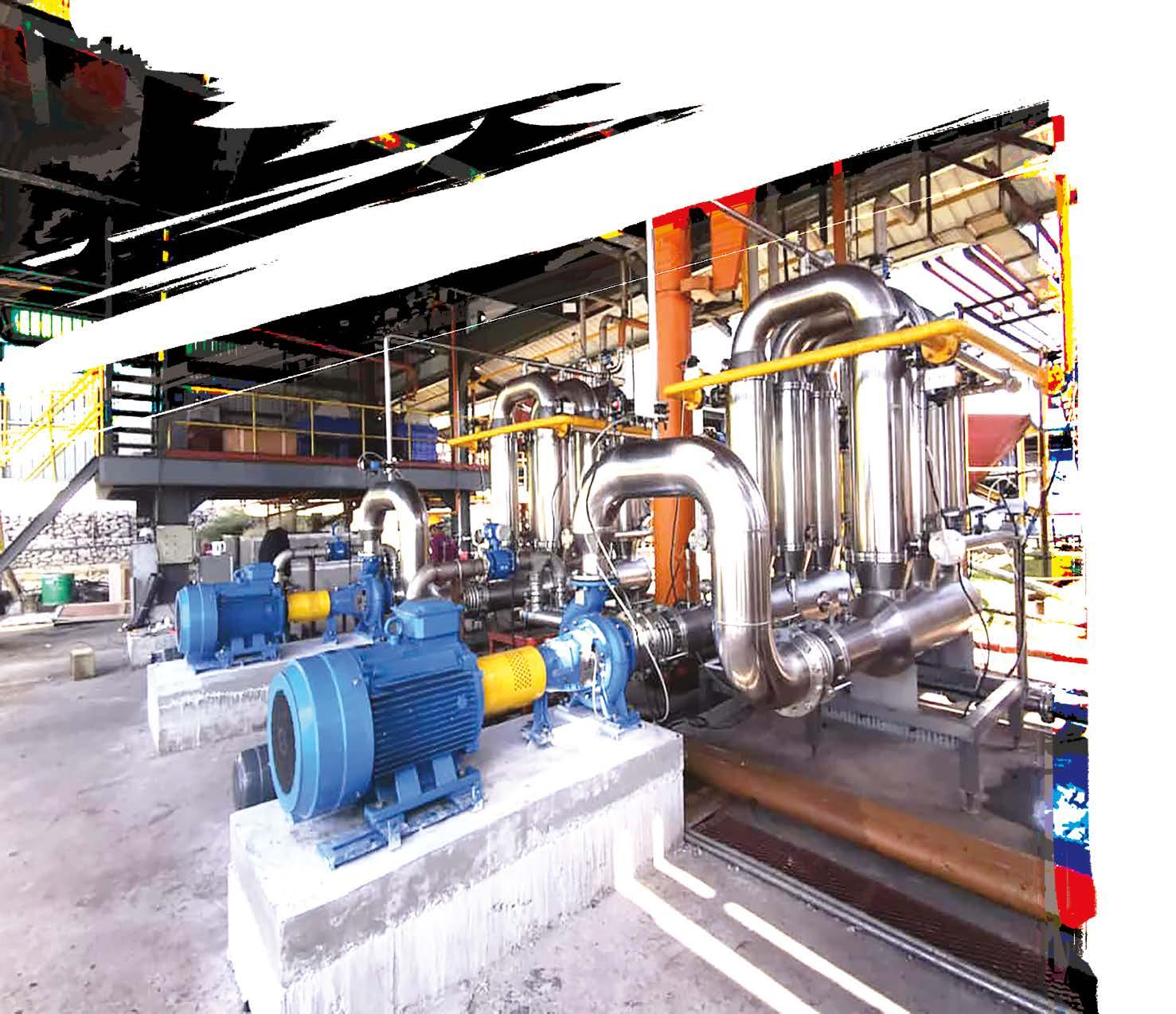

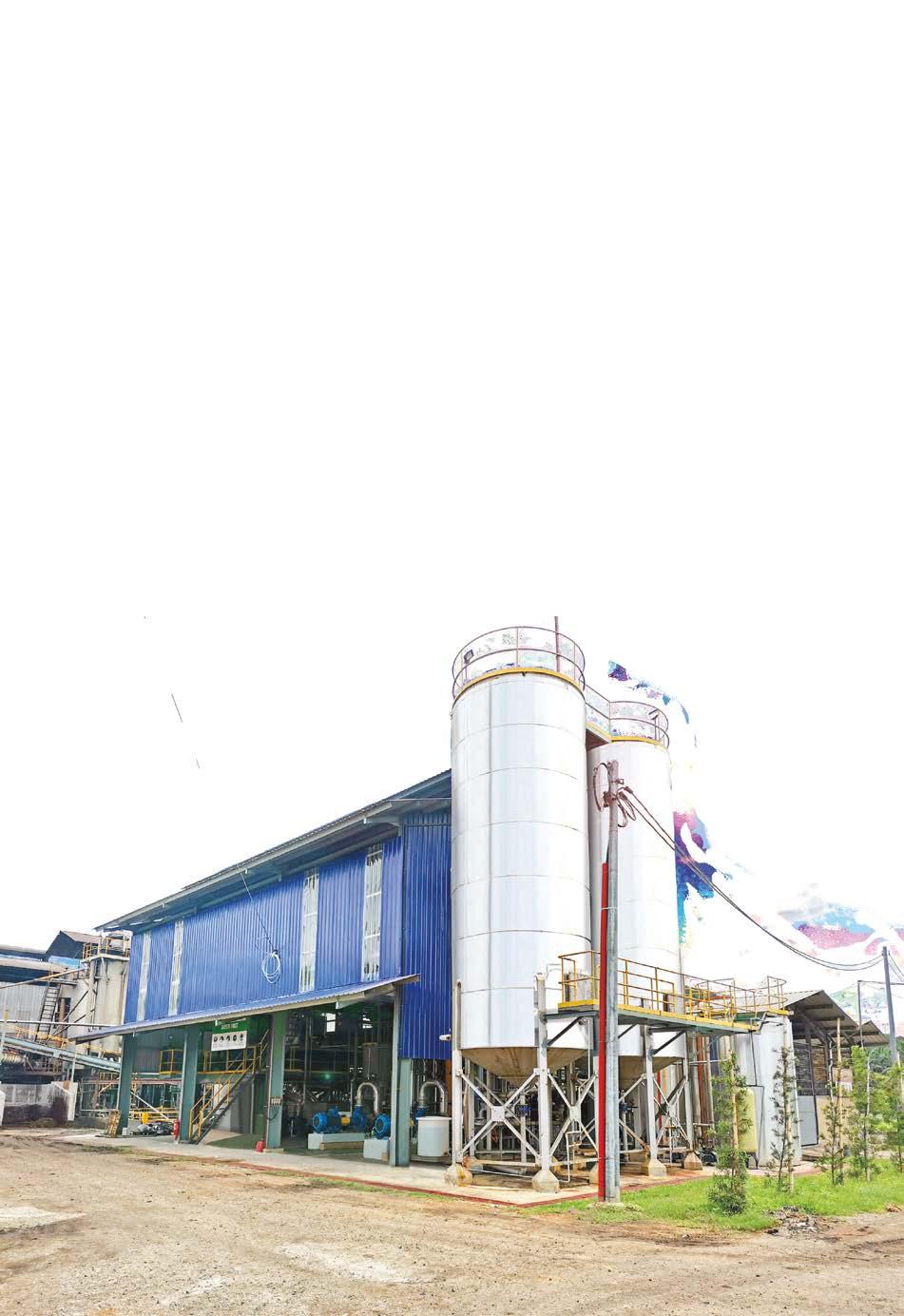
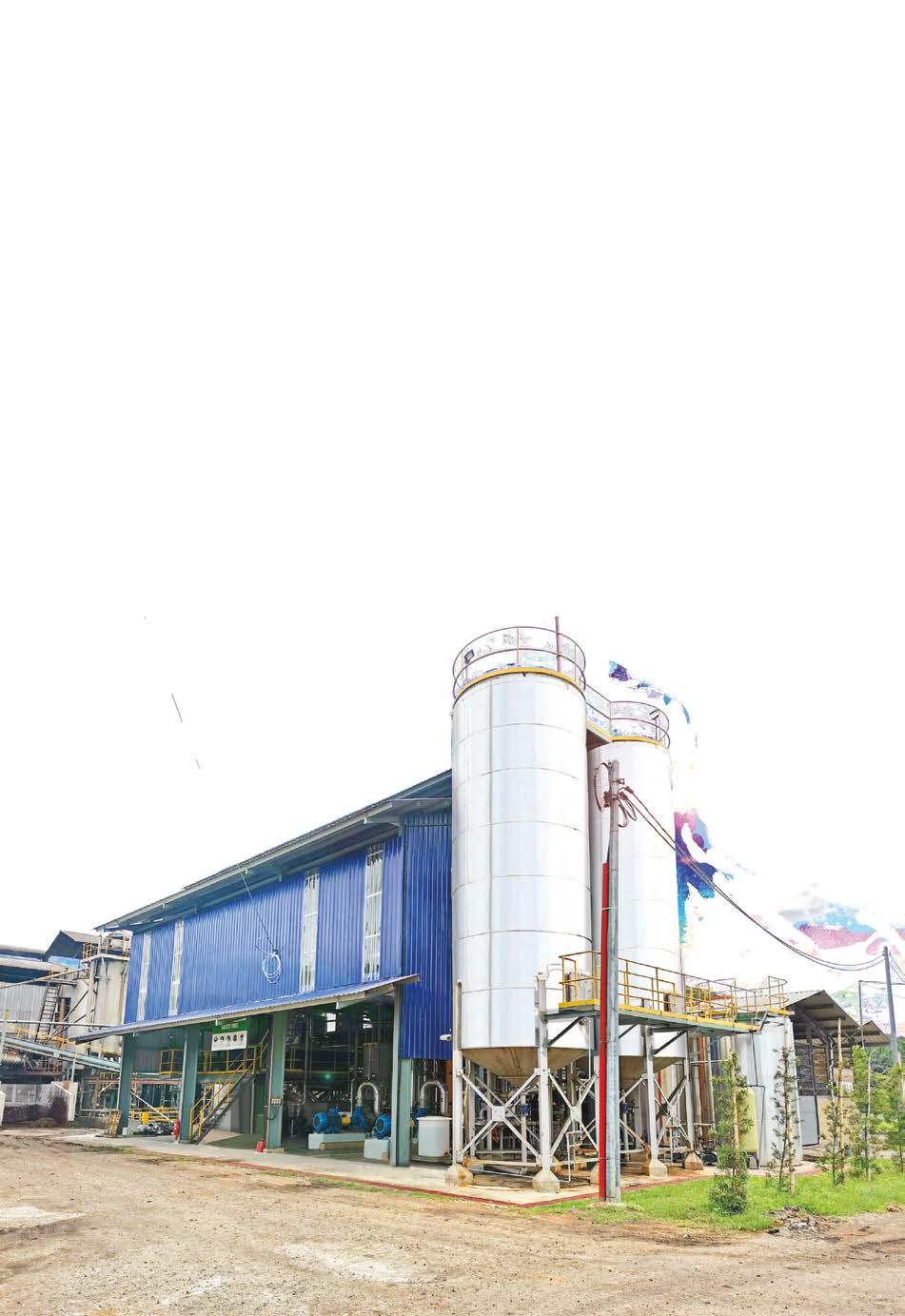

Prime Minister Datuk Seri Anwar Ibrahim has voiced Malaysia's worry regarding the climate change policies of the European Union (EU), specifically highlighting its Deforestation Regulation, which he believes could potentially function as a non-tariff trade barrier. Anwar conveyed this concern during his discussion with Germany's ViceChancellor and Minister for Economic Affairs and Climate Action, Robert Habeck.
Malaysia and the trade bloc have recently initiated a scoping exercise to identify disparities in their positions and perspectives. This exercise aims to guide negotiations by assessing the costs and benefits to the country. Malaysia has already ratified 16 Free Trade Agreements (FTAs) and 62 investment guarantee agreements.
On the other hand, Minister Datuk Seri Johari Abdul Ghani recently stated that the ministry is working on bringing together independent palm oil smallholders to improve land management practices. This aims to ensure timely replanting for consistent and optimal yields. This effort is especially crucial as Malaysia navigates through the implementation of the European Union's Deforestation Regulation (EUDR), which takes effect on December 30.
On behalf of the editorial team, thank you for your continuous support of Asia Palm Oil Magazine. Stay in touch with us at www.asia-palmoil. com and follow us on Facebook and LinkedIn for more updates.

Follow us:



PUBLISHER
FBI Publications (M) Sdn. Bhd.
PUBLICATION MANAGER
Vanny Lim vanny@asiafbi.com
MARKETING COMMUNICATION
Nur Izyan binti Dzulkifli izyandzul@asiafbi.com
ASSISTANT EDITOR
Atthira Zawana atthirazawana@asiafbi.com
CREATIVE DESIGNER
Muhammad Fadzil design@asiafbi.com
BOARD OF DIRECTORS
OFFICIAL MAGAZINE OF

FBI Publications (M) Sdn Bhd (1168942-P)
Unit 9-3, Jalan PJU 5/6, Dataran Sunway, Kota Damansara, 47810 Petaling Jaya, Selangor. | Tel: (+603) 5636 1952
DISTRIBUTED BY
Central Paper Agencies Sdn Bhd (111330-T)
11, Jalan SS 13/3C, Subang Jaya Industrial Estate, 47500 Selangor Darul Ehsan.
Tel: (+603) 5636 1278 / 5636 1358 Fax: (+603) 5636 1952
Email: cpa@tm.net.my Web: www.centralreader.net
PRINTED BY
MMS PRINT SHOP (M) SDN. BHD. (1246387-v)
NO 43G, Jalan PBS 14/2, Taman Perindustrian Bukit Serdang, 43300 Seri Kembangan, Selangor.
Kenny Yong Susan Tricia The

HSS Industrial Products Sdn Bhd


ENDORSED & SUPPORTED BY DISCLAIMER
ASIA PALM OIL MAGAZINE | Apr-Jun 2024 Editor's Message
: Asia Palm Oil Magazine : Asia Palm Oil Magazine Susan Tricia Editor
assertions and opinions expressed in articles and announcements on this magazine reflect the views of the author(s) and do not (necessarily) reflect the views of the publisher. Asia Palm Oil Magazine can in no way be held responsible for the content of such views nor can it be held liable for any direct or indirect damage that may arise from such views. The information in this magazine is regularly supplemented and/or modified. Asia Palm Oil Magazine reserves the right to make any changes with immediate effect and without providing any notice thereof



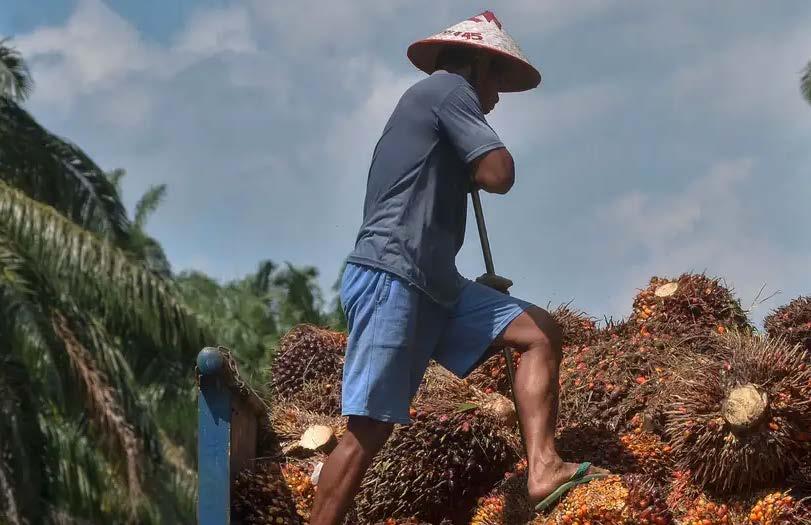
ASIA PALM OIL MAGAZINE | Apr-Jun 2024 > ORGANIZATION NEWS > INDUSTRY NEWS > INTERNATIONAL NEWS 08 -FGV promotes MSPO Logo on Saji Cooking Oil Labels 10 -Using Tech for Better Results 14 -Sime Darby Plantation’s Future Fest ’24 Showcases Palm Oil Industry Transformation 36 -India’s Palm Oil Imports Plunge as Demand for Sunflower Oil Jumps EU Palm Oil Ban: Malaysia, Indonesia Seek Trade Justice Adopt More Inclusive, Fair Treatment on Palm Oil Exports, PM Anwar Tells Germany 27 24 20 -Palm Oil Rallies on Strong Exports, Indonesian Policy Worry 22 -Use “Palm Oil Free” Labels And Face Up to RM250,000 Fine, Warns Plantation and Commodities Ministry 24 -Adopt More Inclusive, Fair Treatment on Palm Oil Exports, PM Anwar Tells Germany 26 -EU Palm Oil Ban: Malaysia, Indonesia Seek Trade Justice 30 -Independent Smallholders Can Form Larger Clusters to Bolster Malaysia’s Palm Oil Output: Johari Ghani 32 -Helping Palm Oil Smallholders Navigate EU Rules 34 -Two Ministries to Join Forces to Drive Innovation in Palm Oil Sector

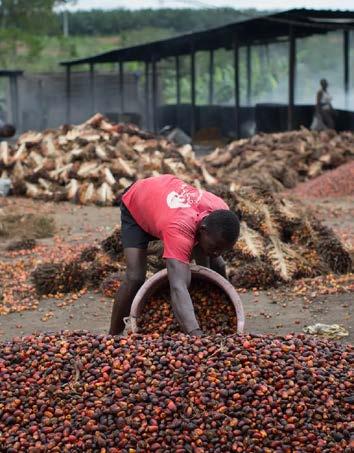
ASIA PALM OIL MAGAZINE | Apr-Jun 2024 My Say: Using Palm Oil Residue for Fuel and Feed Makes Green Sense 44 > GREEN SOLUTIONS 38 - Malaysian Palm Oil Board Starts Trial for Biofertiliser 40 - Growing Greener Commodities – One District at a Time Nigeria Spends N430bn Annually To Import Palm Oil 50 > SPECIAL INSIGHT 50 - Nigeria Spends N430bn Annually to Import Palm Oil 54 - My Say: Using Palm Oil Residue for Fuel and Feed Makes Green Sense 58 - COVID-19 Remembered: The Oil Palm Business Continuity 42 - Enhancing Palm Oil Milling Efficiency with SpecFIT: A Game-Changer in Process Control and Quality Management 46 - MyPalm – Transforming Oil Palm Plantation with Cutting-Edge Technology > TECHNOLOGY AND PRODUCT NEWS
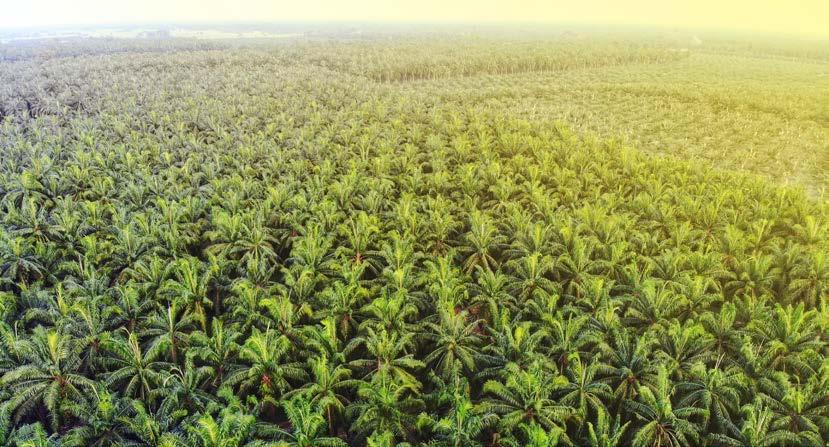
FGV promotes MSPO Logo on Saji Cooking Oil Labels
To promote sustainable practices in the palm oil industry, FGV Holdings Bhd has signed a strategic collaboration with Malaysian Sustainable Palm Oil (MSPO) to promote the latter’s certification label on its Saji cooking oil products.
The agreement aims to endorse the MSPO label on Saji products while raising awareness about sustainability efforts in the country’s palm oil sector.
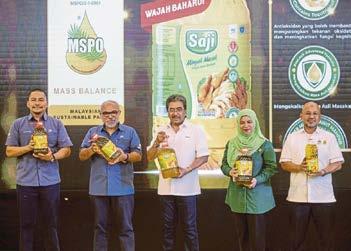
The MSPO logo on Saji cooking oil packaging will benefit FGV’s reputation by increasing consumer confidence, which will open up new markets focused on environmental sustainability. - File pic credit (Hazreen Mohamad)

FGV Holdings Bhd chairman Tan Sri Rastam Mohd Isa said he took pride in collaborating with MSPO and becoming the first company to use the MSPO certification logo on Saji cooking oil labels.
“We are confident that this effort will open up new market opportunities domestically and internationally, including enhancing consumer confidence.
“This initiative aligns with our commitment to ensuring sustainability practices are applied across every aspect of our group’s operations to generate value and benefit stakeholders.
“At FGV, we believe that prioritizing sustainability will lead to profitability and company growth,” he said at the launch of the Saji cooking oil’s new label with the MSPO certification logo at AEON BiG in Wangsa Maju.
The launch was attended by Plantation and Commodities Minister Datuk Seri Johari Abdul Ghani.
FGV Holding Bhd group chief sustainability officer Nurul Hasanah Ahamed Hassain Malim said the addition of the MSPO logo on Saji cooking oil packaging will benefit FGV by
ASIA PALM OIL MAGAZINE | Apr-Jun 2024 8
boosting consumer trust, accessing eco-conscious markets and demonstrating compliance with MSPO standards.
“This certification enhances FGV’s reputation as a leading global producer of crude palm oil (CPO), showcasing its commitment to sustainability through various certifications like the Roundtable on Sustainable Palm Oil, International Sustainability and Carbon Certification and Green Gold Label.
“These efforts position FGV uniquely in global trade, particularly in sustainability-focused markets.”
MSPO chairman Dr Suzana Idayu Wati Osman emphasized the significance of addressing key issues such as human rights, environmental protection, wildlife conservation and business advancement within the palm oil industry.
“With FGV’s prominent position in the industry and its vital role in supporting socio-economic development, particularly for smallholder palm oil farmers, the collaboration between MSPO and FGV takes on added importance in promoting MSPO’s certification to international markets,” he added.
Last year, Saji led the local cooking oil market with a 45 per cent share and was awarded the ‘Top Brand with the Highest Increase in Buyers in 2022’ by the Kantar Worldpanel.
Saji cooking oil and other palm-based products from FGV are also exported to Myanmar, Afghanistan, Barbados, Cambodia, Chile, Djibouti, Kazakhstan, Lebanon, Nigeria, Senegal, Thailand and Togo, with exports totaling 84,000 metric tonnes and valued at RM376 million last year.
As the world’s largest producer of CPO, FGV is also the largest buyer of fresh fruit bunches from local smallholders and Felda settlers.
FGV goes beyond financial support, extending its sustainability commitment to nationwide development programmes for Felda settlers through consultation and training.
Since 2020, it has invested RM4.05 million to engage 1,000 smallholders in this initiative.
Change your bearing now









No corrosion, no additional lubrication, light weight. This is what makes our high-performance plastics special. They replace metal in plain, spherical and ball bearings, in slewing ring bearings and in linear technology. Less cost and higher service life for moving applications, proven in the igus® test lab; get a competitive edge with our dry-tech® range. All motion plastics® can be configured and calculated online. igus-asean.com/dry-tech igus ® Malaysia Sdn Bhd, Suite 1601-1, Level


16, Tower 2, Wisma Amfirst, Jalan SS7/15 (Jalan Stadium), 47301 Kelana Jaya Selangor, Malaysia Tel. +603 7803 0618 my-info@igus.net motion plastics®
Source: www.nst.com.my
Using Tech for Better Results
Sime Darby Plantation Bhd (SD Plantation) plans to widen the use of technology in its operations on the ground to attract more Malaysians to work in oil palm plantations and change their perception of what is often regarded as 3D (dangerous, difficult, and dirty) jobs in the sector.
With mechanisation and automation, the company aims to reduce reliance on foreign labour and improve its worker-toland ratio to 1:17.5ha by 2027, compared to the current industry average of 1:8ha.
This would also lead to better wages for the employees, it added.
The land-to-worker ratio in palm oil operatiw ons correlates with the industry’s efficiency and level of mechanisation, potentially influencing the demand for labour.
Through this strategy, the company has set its sights to attract and employ workers who have the skills to operate machinery as well as those who are willing to learn and work with advanced technology.
The company held the inaugural “SD Plantation Future Fest 2024” on Feb 23-24 to educate the public on its mechanisation, automation and digitalisation initiatives and highlight the journey and progress it was undertaking to transform oil palm plantations.
Mechanisation and automation had long been the company’s goal to change the age-old method of working in plantations.
However, the cost to include current technology in its operations was costly, especially when it was not widely available in the country.
“It is true that things have not changed much in the last 60 to 70 years. I would say that people have been looking at ways to mechanise between the 1990s and early 2000s because as an industry, we know that foreign labour is not sustainable in the long run.
“However, it takes a lot of money to invest in machines and that was and is going to be a barrier,” said chief research and development officer Dr David Ross Appleton.
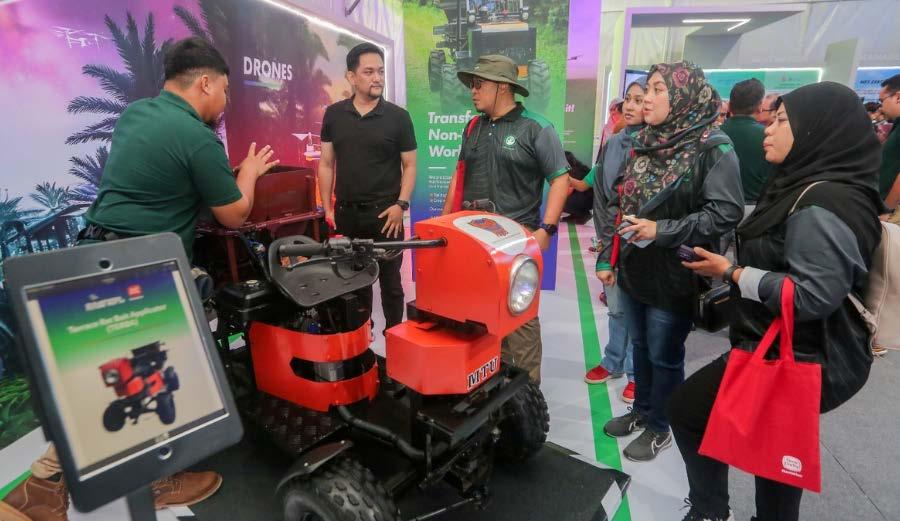
ASIA PALM OIL MAGAZINE | Apr-Jun 2024 10
SD Plantation aims to have one man per 17.5ha by 2027, utilising automation and employing local workers. - File pic credit (Faiz Anuar)
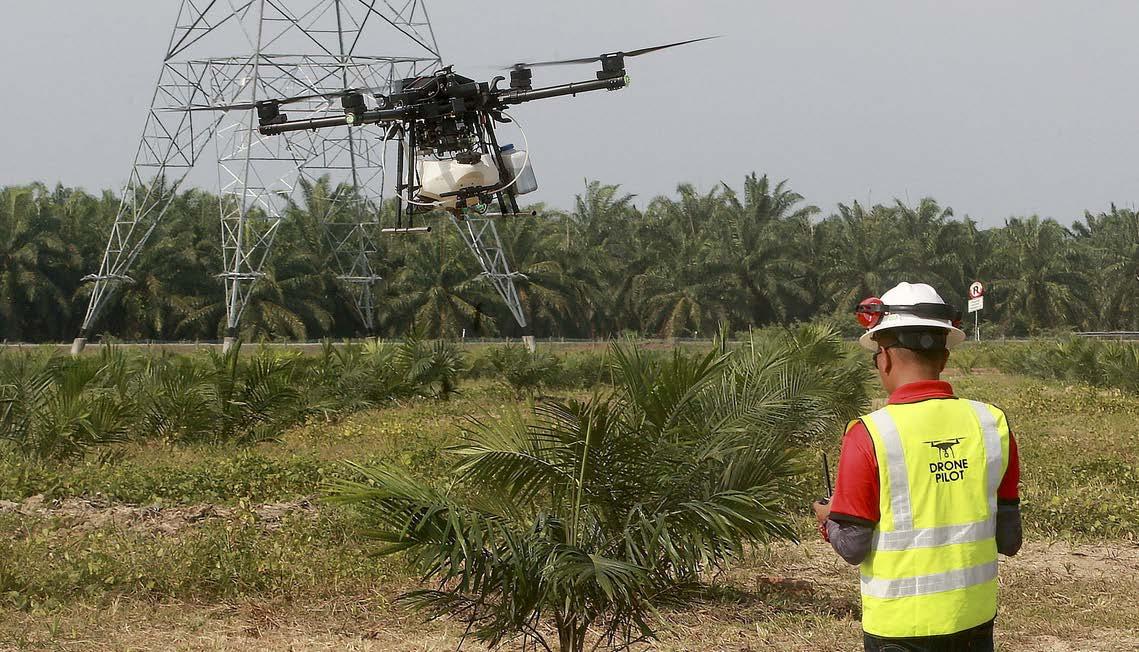
In the early 2000s, he said different kinds of cutting devices were experimented with, including tractors with robotic arms to pick up the fresh fruit bunches (FFBs). These were built to incrementally improve labour.
When the COVID-19 pandemic hit in 2019, the company realised that it had to invest in technology to reduce dependence on foreign workers due to the stricter recruitment guidelines.
“COVID-19 was a wake-up call. It showed us that the problem with labour was no longer in the distant future. It is happening now. We then devised plans to accelerate the use of technology in plantations.”
How automation improves efficiency
Chief human resources officer Zulkifli Zainal Abidin said the company aimed to have a 100 per cent local workforce for its non-harvesting work by 2027.
Mechanisation is among the viable options that SD Plantation is using to attract local youths.
He said Malaysians would be prioritised to operate these machines, although harvesting FFBs would still be done manually due to its complexity.
The company has yet to come up with a machine that could ease the process.
“By 2027, we target to have one man for 17.5ha with the help of automation and it will be done by local workers.
“To achieve this, we will need to introduce more machines, mainly for fertilisers and pest control. We also will have to look at the condition of the land to ensure the machines can adapt to the different terrains in oil palm plantations, especially for matured crops.”
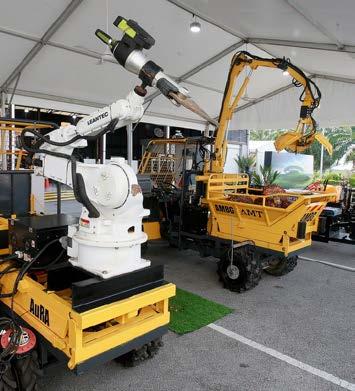
ASIA PALM OIL MAGAZINE | Apr-Jun 2024
Zulkifli added that the company was able to mechanise almost all nurseries and immature farms as these areas were more accessible and easier to manage. Mature farms are mainly situated on uneven land.
“We are looking at autonomous vehicles for our plantations. These are for the jobs that cannot be done by humans.
“We want to have machines that have sensors to identify pests and spray pesticide on the crops. There are various prototypes that are being analysed and they require time to be developed and tested before they can be used on our farms.
“During events like the Sime Darby Plantation Future Fest, we can show to the public how the industry has changed with the usage of machines. We want to create awareness on this matter and change the perception of 3D jobs.”
Collaboration with UM
SD Plantation is collaborating with Universiti Malaya to produce laser cutting tools in a bid to modernise the plantation sector.
Present at the signing of the memorandum of understanding was deputy plantation and commodities minister Datuk Chan Foong Hin, who lauded the initiative.
“This needs to be emulated to future-proof the plantation sector through ongoing research, development and commercialisation.
“Through mechanisation and automation in plantation operations, this sector will be capable of providing high-value job opportunities that guarantee a competitive income,” he said in his speech.
Some 1,800 visitors attended the two-day event, which was packed with demonstrations of best and sustainable agricultural practices as well as new machines in oil palm plantations, talk shows and tours of heritage buildings, as well as soap and candle-making activities using palm oil.
The event had several booths where SD Plantation also showcased the use of palm oil in the food industry and new prototypes and technologies the company was developing to transform work in oil palm plantations.

ASIA PALM OIL MAGAZINE | Apr-Jun 2024 12
Source: www.nst.com.my
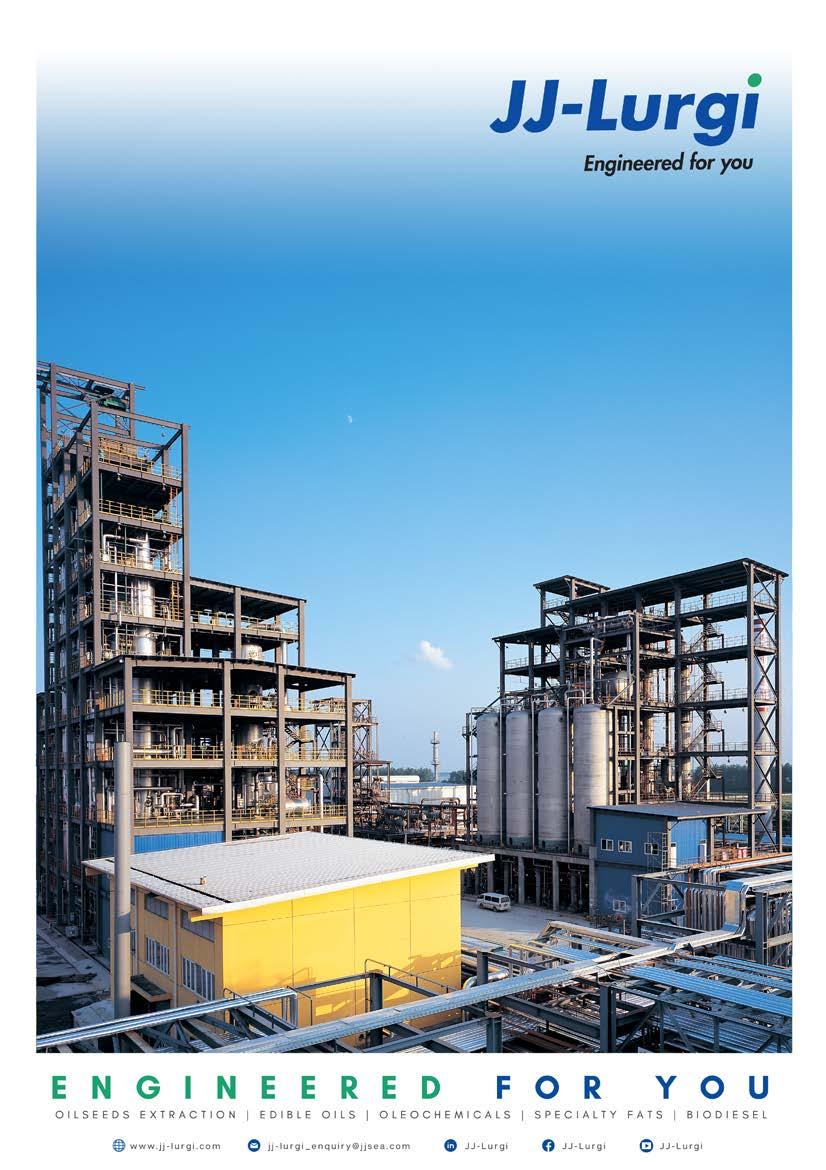
Sime Darby Plantation’s Future Fest ’24 Showcases Palm Oil Industry Transformation
The fest is a platform for like-minded individuals to unite in their commitment to sustainability and the future of agriculture
Sime Darby Plantation Bhd (SDP) played host to 1,806 participants at its inaugural SDP Future Fest ‘24 on Feb 24 and 25, 2024 at Carey Island, Selangor where the palm oil industry’s transformation was showcased.
Attendees immersed themselves in oil palm greenery, witnessing flying drones, robotics and scientific innovations shaping the industry while interactive workshops, seminars, and heritage tours provided insights into the sector’s history and cultural significance.
These experiences provided valuable insights into the history and cultural significance of the palm oil sector.
Moreover, attendees were treated to countless Instagramworthy moments as they explored the festival grounds and indulged in delicious local cuisine.

SDP Future Fest was a platform for like-minded individuals to unite in their commitment to sustainability and the future of agriculture.
The event layout was divided into five different spaces — the Main Tent, EduPalm Field Demo, Edutainment Lounge, Michigan Technological University (MTU) and Robotics Workshop and Heritage and Biodiversity Tour.
The Main Tent
The first stop, the Main Tent, was where most of the exhibitions and booths were located.
The first two booths showcased sustainability and renewables. As global temperatures are projected to increase by 1.5°C before 2040, it is a well-known fact that urgent action is required to limit temperature fluctuations within this threshold.
Therefore, SDP acknowledges the imperative for all stakeholders to play a role in reducing emissions.
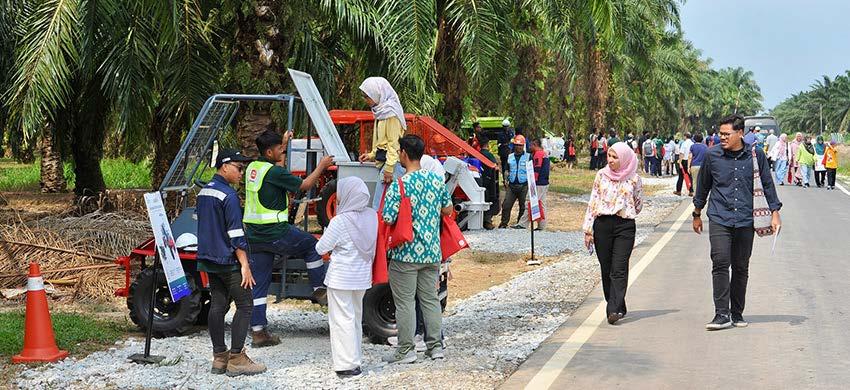
ASIA PALM OIL MAGAZINE | Apr-Jun 2024 14
Attendees immersed themselves in oil palm greenery, witnessing flying drones, robotics and scientific innovations shaping the industry (pic: HUSSIEN SHAHARUDDIN/TMR)

Aligned with its commitment to protect and enhance the environment, SDP has set a target of a 50% reduction in carbon intensity by 2030, as part of the nation’s journey towards achieving net-zero aspirations.
“Our action plan is comprehensive and clearly defined. We are actively engaged in efforts to restore degraded land, safeguard habitats, promote responsible agricultural practices and foster a circular economy through renewable energy (RE) initiatives.
“A critical aspect of our strategy involves eliminating deforestation from our supply chain, recognizing the complexity of this task within the broader ecosystem,” an SDP spokesperson told The Malaysian Reserve (TMR)
Despite encountering challenges, SDP has made substantial investments to expedite progress towards our climate-positive targets.
“We have prioritized infrastructure investments to support climate change adaptation and mitigation efforts,” the spokesperson added.
SDP implements diverse climate-related strategies to mitigate emissions and promote sustainability.
These strategies involve investing in biogas plants and solar photovoltaics (PV) systems, enhancing operational efficiency globally, and implementing nature-based solutions like conservation areas and tree planting initiatives across multiple countries.
Additionally, SDP aims to eliminate deforestation from its supply chain by engaging with suppliers and smallholders and ensuring transparency through traceability platforms.
Collaboration with partners and investment in research and development further reinforce SDP’s commitment to driving positive environmental impact and aligning with global climate goals.
Upholding responsible agriculture and human rights charters, SDP ensures adherence to No Deforestation, No Peat and No Exploitation (NDPE) principles.
Collaboration with suppliers is essential in maintaining these commitments throughout the supply chain.
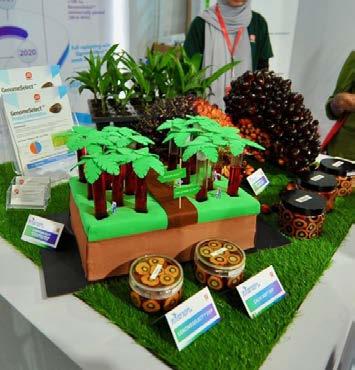
The GenomeSelectTM oil palm seed receives the Edison Award (energy and sustainability category)
SDP’s Plant-A-Tree programme, launched in 2008, has seen nearly 1.9 million forest trees planted, including 120 endangered, rare and threatened (ERT) species across various landscapes like orangutan habitats and mangrove areas.
“With a target of three million trees by 2025, the programme showcased significant achievements, detailed in two guidebooks documenting flora and fauna growth,” the spokesperson said.
Next to the sustainability booth, the renewables booth showcased “Creating RE and Turning Waste to Wealth for Palm Oil Millers”.
It highlighted SDP’s commitment to achieving a 42% carbon emission reduction (CER) by 2030 for energy and industrial (E&I), Scope 1 and Scope 2 emissions.
The focus was on the CER Initiative via biogas projects, aimed at moving towards a net-zero ambition.
Previously, SDP announced its commitment to progressively developing more biogas plants to capture methane emissions from palm oil mill effluent (POME).
This innovative approach not only addresses environmental concerns but also contributes to RE production.
ASIA PALM OIL MAGAZINE | Apr-Jun 2024

By harnessing biogas, SDP aims to convert waste into a valuable resource while significantly reducing carbon emissions associated with palm oil milling processes.
Moreover, the booth provided insights into the technological advancements and operational strategies employed by SDP to achieve these ambitious sustainability goals.
It served as a platform to educate stakeholders about the importance of RE and waste management in mitigating climate change impacts within the palm oil industry.
Digital and Innovation
Meanwhile, the digital and Innovation area showcased palm oil applications such as confectionery, bakery, frying and dairy.
Palm oil serves as a dairy fat replacer, widely used in various products, with approximately 90% of supermarket items in Malaysia containing it.
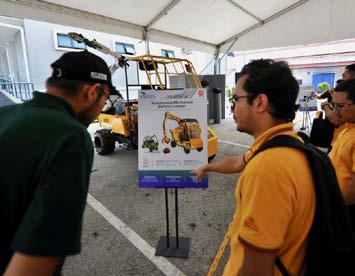
The spokesperson pointed out that many people are unaware of palm oil’s presence in everyday items, from breakfast to personal care products.
“Our initiative aims to raise public awareness and provide breakthrough evidence for replication.
“Innovation is continuous, and we strive to engage the public annually to discover new applications,” he said.
In a recent development, Sime Darby Plantation Seeds & Agricultural Services Sdn Bhd (SDPSAS), formerly known as Guthrie Plantation & Agricultural Services Sdn Bhd (GPAS) have produced GenomeSelectTM.
As the commercial arm of the research and development (R&D) center, SDPSAS has taken on the responsibility of marketing products and technologies developed within the R&D center, while also offering management expertise in plantation crops to external customers of the Sime Darby Group.
With a wealth of over 80 years of research in plantation crops and a team of more than 100 scientists and technologists, SDPSAS is committed to delivering innovative solutions and services to the agricultural sector.
The GenomeSelectTM oil palm seed received the Edison Award (energy and sustainability category) in April 2017, making it SDPSAS’ most successful planting material to date in terms of yield per ha.
Demonstrating exceptional performance, GenomeSelectTM was planted across 4,728ha from 2016 to 2022, yielding impressive results.
Notably, GenomeSelectTM recorded significant improvements in oil extraction rates (OERs), with a 25% to 31% increase across all soil types.
Furthermore, routine genetic testing ensures over 99% genetic purity for both GenomeSelectTM and calixQ6TM.
According to data from September 2023, GenomeSelectTM achieved a 22.2% OER and a 25.1% of total OER, showcasing its remarkable effectiveness in boosting productivity.
Guthrie Agri Bio
Moving on, the Guthrie Agri Bio booth showcased products and services that are the result of rigorous R&D efforts.
These products undergo comprehensive field testing to ensure effectiveness and efficiency before being released commercially.
The range includes various tools such as harvesting poles, sickles and rat baits. Additionally, they offer fertilizers like NK Compact (NKC) and Muriate of Potash (MOP), tailored for optimized crop growth.
The company also provides ago-chemicals including herbicides for weed control and rodenticides for pest management.
Innovative Mecha-Tech solutions like the battery-powered ePangkas, eSorong, and eGagah series offer mechanized bunches into sizeable 10MT bins
ASIA PALM OIL MAGAZINE | Apr-Jun 2024 16
assistance in agricultural tasks, catering to the evolving needs of modern farming practices.
EduPalm Field Demo
Outside of the main tent, the attendees at the EduPalm Field Demo were treated to a glimpse of the future of plantation management.
Drones, mechanized wonders and autonomous machines took center stage, offering solutions tailored to various terrain challenges.
Among the star attractions were the laser ripeness sensor prototype and an autonomous robotic arm, promising precision and efficiency in fruit assessment and handling.
One standout was the mechanical buffalo with scissors lift (MBSL), a marvel designed to swiftly evacuate fresh fruit bunches into sizeable 10 metric-tonne (MT) bins.
Rigorously tested and approved by the Standard and Industrial Research Institute of Malaysia (SIRIM), the MBSL boasts a capacity of at least 600kg, ensuring stability across diverse surface conditions while covering 18ha per day.
Not to be outdone, the mechanical buffalo with grabber (MBG) showcased its prowess in the ground-to-bin evacuation of hefty fruit bunches.
With its integrated grabber arm, the MBG eliminates the need for manual intervention, directly transferring fruit bunches into the 10MT bin, covering up to 20ha per day.
In addressing herbicide application, the herbicide sprayer (ImHS) emerged as a game-changer, significantly reducing labor demands by five individuals per day.
Its efficient circle spraying method covers 15ha daily, resulting in estimated cost and labor reductions of 38% and 67% respectively.
For mature areas, the Azman Sri Pulai herbicide strip sprayer stole the spotlight.
Developed in-house, this machine caters to terrains with less than 15-degree slopes, reducing manpower needs by three workers daily while covering 8ha to 9ha a day. Its implementation promises a staggering 63% reduction in costs.

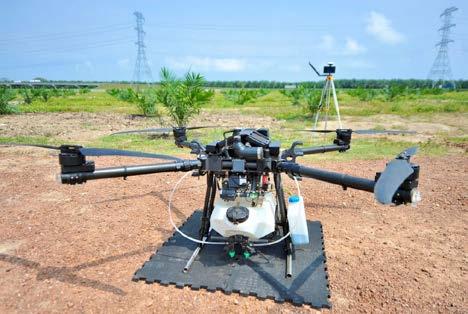
The Point-To-Point Drone Sprayer delivers extended hectarage precision spraying of pesticide based on crown tracking, using artificial intelligence
Meanwhile, the Hasrul fertilizer lift (HFL) and mechanized terrace fertilizer applicator (MTFA) showcased their prowess in fertilization, each slashing labor requirements by four workers daily while efficiently covering 8ha per day.
ST101 GEO
Lastly, the ST101 GEO strip sprayer was unveiled as a lifeline for upstream Malaysia estates grappling with acute labor shortages, of which 71 units have been deployed.
Designed for strip spraying in mature areas, its deployment has the potential to slash labor needs at a ratio of 1:5.
In a separate presentation, SDP chief digital Aditya Tuli shared with the audience a transformative initiative that began nearly three years ago, aiming to reshape the future of the plantation industry.
Despite over a century of existence, the Malaysian palm oil sector has seen minimal evolution, with labor-intensive practices persisting.
The industry, boasting over 5.6 million ha of planted land and employing over half a million workers, faces challenges in adapting to changing times.
Recent events like the Covid-19 pandemic further underscore the need for innovation, prompting SDP to launch Project Infinity, he explained.
ASIA PALM OIL MAGAZINE | Apr-Jun 2024

“This initiative seeks to revolutionize plantation operations by embracing advanced technologies like drones and robotics.
“By introducing mechanization and automation, the project aims to enhance productivity and reduce reliance on foreign labor,” he said.
Through collaborations with technology partners worldwide, including startups and research institutes, he affirmed that SDP is at the forefront of driving industry-wide transformation.
UGVs
In recent months, Tuli said SDP has witnessed rapid advancements in technology, with older versions of prototypes quickly evolving into newer iterations.
Notably, unmanned ground-based vehicles (UGVs) have emerged as a key solution, autonomously spreading fertilizers in plantations without human intervention.
As the technology progresses, newer versions of these prototypes are already in development, hinting at imminent commercial rollout.
Alongside UGVs, other innovations like laser tree detection systems and harvesting prototypes are being explored.
These advancements require supporting infrastructure such as charging facilities and connectivity, with the development of comprehensive software management systems like Palm Digital underway.
However, it is not just technology that is evolving; significant changes are occurring on the human front, too.
Job roles within plantations are shifting, with a focus on training drone pilots, park operators, and various engineering specialists.
This shift is attracting a younger workforce, including women, previously deterred by the labor-intensive nature of plantation work.
“The company is witnessing a paradigm shift, not only in technology adoption but also in workforce diversity and skill development, heralding a new era of innovation and opportunity within the industry,” Tuli said.
SDP chief R&D officer David Ross Appleton said with engineers working on process improvement across mills and refineries, and scientists focusing on product development, the R&D division tackles diverse challenges in both upstream and downstream operations.
“Prioritization of projects involves balancing fundamental research with practical applications, focusing on critical issues like yield improvement and climate change resilience.
“Major investments in projects such as the Genome project underscore the company’s commitment to innovation and addressing industry-wide challenges,” he told TMR
The team comprises around 150 scientists and 1,000 personnel involved in various research and fieldwork activities.
Robotics Workshop
As automation becomes increasingly crucial, initiatives like the Infinity programme aim to accelerate the adoption of new technologies to mitigate labor shortages and improve plantation efficiency.
“While solutions like mechanized wheelbarrows and tractor systems have been explored since the early 2000s, recent advancements in robotics offer promising prospects for further automation, although challenges such as fruit harvesting automation remain complex.

prototype and an autonomous robotic arm
ASIA PALM OIL MAGAZINE | Apr-Jun 2024 18
“Nevertheless, ongoing efforts to mechanize and automate plantation tasks aim to optimize resource allocation and enhance productivity in the face of evolving industry demands and job constraints,” Appleton added.
Moreover, SDP also aims to gradually reduce foreign workers in its oil palm plantations and target 100% local workforce in the sector by 2027.
This initiative, implemented through the local project, will incorporate agricultural technology such as drone usage for fertilization, pest control and remote machinery operation.
According to SDP chief human resources officer Zulkifli Zainal Abidin, the reduction in foreign labor during this period will involve increasing the ratio of workers from one worker per 8ha area to 17.5ha.
“The objective of the local project is to recruit as many locals as possible to fill the vacancies in plantations nationwide.
“This came after the COVID-19 pandemic forced many foreign workers to return home and some were unable to reenter. Initially, we hired locals to fill the vacancies,” he said in a press conference.
Furthermore, besides reducing reliance on foreign workers, the planned mechanization aims to change perceptions about plantation work being difficult, dirty and dangerous (3D).
However, during this period, foreign workers will be retained for tasks related to fruit bunch harvesting until technology and mechanization for these activities are introduced.
In his speech on Feb 23, Agriculture and Commodities Deputy Minister Datuk Chan Foong Hin said the ministry, represented by the Malaysian Agricultural and Commodities Institute (IMPAC), expressed deep gratitude towards SDP for their collaboration in advancing the government’s mission to cultivate a knowledgeable and skilled workforce.
He spoke about how IMPAC, designated as the Industry Lead Body by the Department of Skills Development (JPK), is pivotal in driving the technical and vocational education and training (TVET) agenda within the agriculture and commodities sector.
To note, IMPAC has taken proactive measures to foster an environment that appeals to the younger generation,
encouraging them to pursue careers in the agri-commodity field.
The integration of mechanization and automation into farming practices is highlighted as a significant avenue for creating highvalue job opportunities, and ensuring competitive wages within the sector.
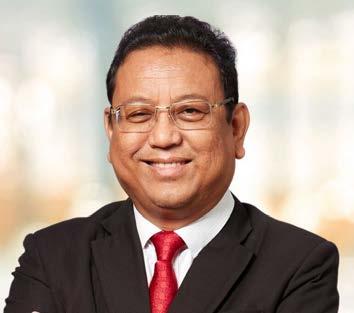
Our dream is to build the ‘Plantation of the Future’, says Nik Norzrul Thani
SDP also signed a memorandum of agreement (MOA) with Universiti Malaya for R&D of laser cutting tools for fruit bunch harvesting.
Additionally, the plantation company signed an MOA with the Malaysian Palm Oil Board (MPOB) for the development of machinery experts.
SDP chairman Tan Sri Dr Nik Norzrul Thani Nik Hassan Thani said the SDP Future Fest’24 was the first of its kind to showcase the latest technology advancements in trans-forming oil palm plantation work.
“Today, advanced machinery and technology have been implemented in our plantations. Some machines or technologies are still undergoing testing before being used and commercialized.
“Our dream is to build the ‘Plantation of the Future’. We believe that the changes we envision will not only elevate the oil palm plantation sector to excellence but also attract more locals to join the palm oil industry in our country,” he said.

Source: themalaysianreserve.com
ASIA PALM OIL MAGAZINE | Apr-Jun 2024
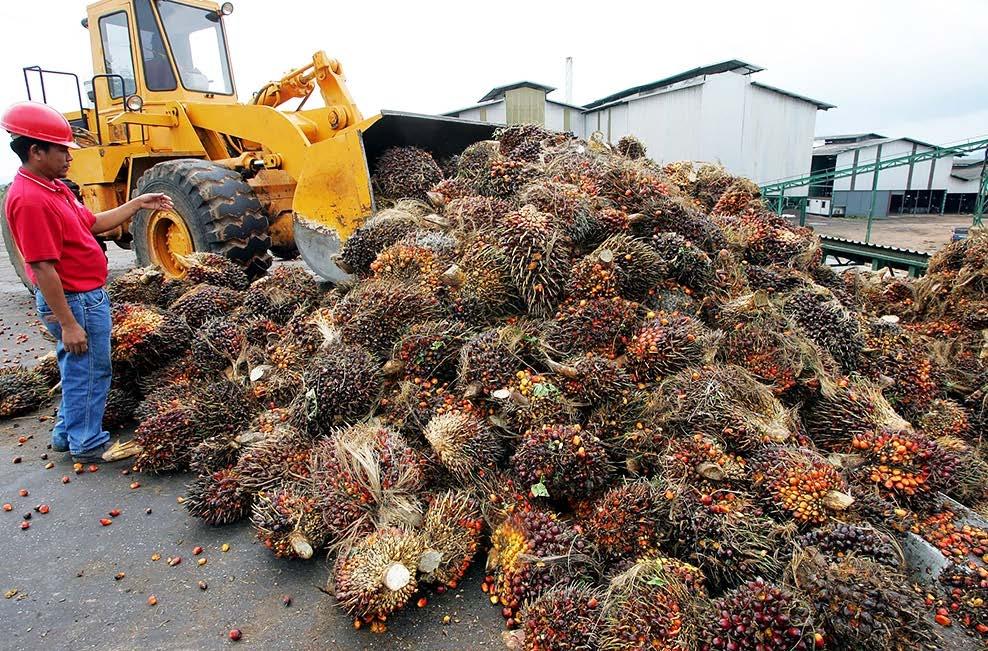
Malaysian palm oil exports climbed 14% from last month, driven by demand from Africa, India, and the Middle East. (Reuters pic)
Palm Oil Rallies on Strong Exports, Indonesian Policy Worry
Efforts to safeguard domestic prices may restrict supply from the world’s largest shipper.
Palm oil snapped a two-day drop on optimism that Malaysian exports will be robust this month, and on concerns that potential Indonesian policy changes could limit supplies from the biggest shipper.
The gains this morning is mainly due to the strength in Malaysia’s export performance this month, according to David Ng, a senior trader at IcebergX Sdn in Kuala Lumpur.
After the end of the morning session, Intertek Testing Services reported shipments climbed 14% during March 1-25 from a month earlier, thanks to stronger demand from Africa, India and the Middle East. AmSpec Agri will release data for the same period.
The market is also waiting for clarity on Indonesia’s plan to tweak its domestic market obligation policy, known as DMO,
Ng said. The government is mulling a revision in the policy by linking it to production, instead of exports, Edy Priyono, deputy at the presidential staff office, said.
The rule currently allows companies to export some palm oil products after supplying certain volumes of cooking oil domestically, but the policy is vulnerable when export demand slows down, Priyono said. Linking the DMO to output will help prevent impact from the global market, he added.
“We’ll especially want to know how much quota is being allocated based on the production,” IcebergX’s Ng said.
“With this policy in place, it looks like supply will be pretty much domestic-driven rather than export-oriented, and could mean that supply availability from Indonesia may be restricted going forward in order to safeguard domestic prices.”
ASIA PALM OIL MAGAZINE | Apr-Jun 2024 20
Source: www.freemalaysiatoday.com INDUSTRY NEWS
Clean Energy for A Better Future



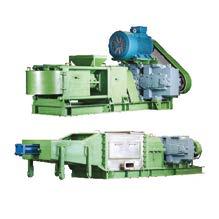

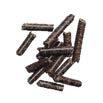






Use “Palm Oil Free” Labels And Face Up to RM250,000 Fine, Warns Plantation and Commodities Ministry
The government has warned against the use of discriminatory “Palm Oil Free” labels on products based on the commodity, with those found guilty can be fined up to RM250,000.
The use of labels on products that discriminate against palm oil such as “palm oil free” is prohibited under the Trade Descriptions Act 2011, Plantation and Commodities Minister Datuk Seri Johari Abdul Ghani said.
Johari said his ministry will work with Domestic Trade and Costs of Living Ministry to enforce the rule and take immediate action against errant traders and marketers.
“The ministry will collaborate with the Ministry of Domestic Trade and Costs of Living to enforce and take immediate action against supermarkets that market such products,” Johari said.
The Malaysian Palm Oil Council, he added, had conducted a study to identify products labelled as discriminatory against palm oil in the country.
“Out of 251 premises surveyed around the Klang Valley, 80 were found to display products labelled No Palm Oil,” he said in a Facebook post after attending the signing ceremony between FGV Holdings Bhd and Malaysian Sustainable Palm Oil (MSPO) on Saturday.
He also launched the new Saji cooking oil, which features the MSPO logo, at Aeon Big Wangsa Maju.
According to Johari, the survey also revealed that imported products from abroad, which have no relevance to palm oil but carry the label “No Palm Oil” as a form of promoting discrimination against palm oil, were found.
He noted that a collaboration with the Customs Department will be established to detain products labelled ‘No Palm Oil’ at the entry points before they are brought into Malaysia.
Meanwhile, Johari said the signing of the Memorandum of Understanding (MoU) between FGV and MSPO demonstrates a significant initiative in promoting MSPO.
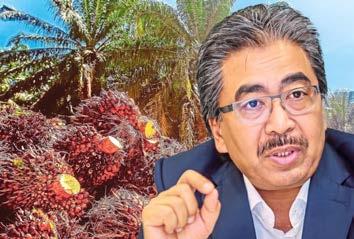
The use of labels on products that discriminate against palm oil such as “palm oil free” is prohibited under the Trade Descriptions Act 2011, Plantation and Commodities Minister Datuk Seri Johari Abdul Ghani said. (NSTP/PHOTO)
He added that the use of the MSPO logo on Saji cooking oil packaging shows a commitment to compliance with sustainability standards and enhances the brand reputation of FGV products as Malaysia’s palm oil exporter to foreign countries.
“This step can also expand the branding of MSPO domestically and internationally, thus strengthening the country’s commitment to becoming a sustainable palm oil producer globally,” he said.
ASIA PALM OIL MAGAZINE | Apr-Jun 2024 22 INDUSTRY NEWS
Source: www.nst.com.my
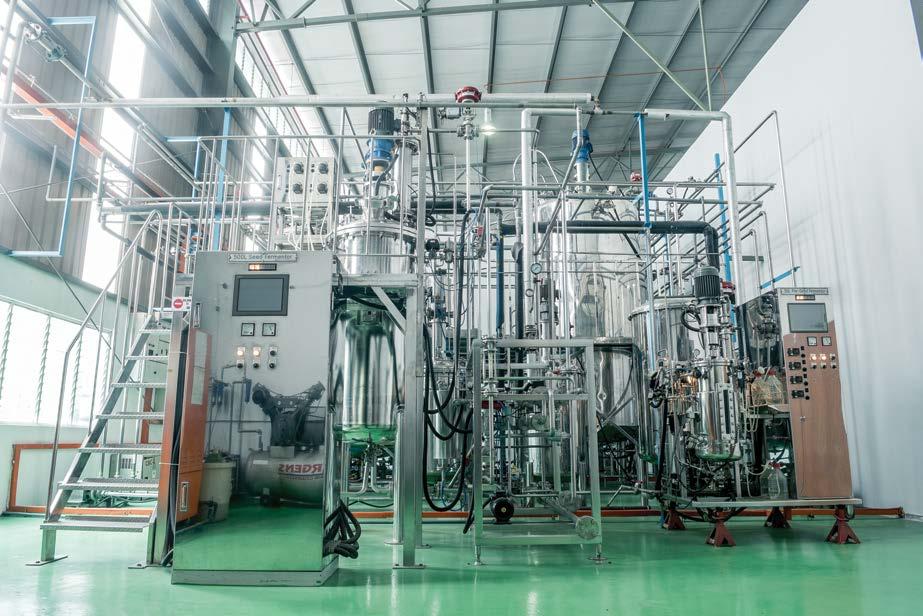






Adopt More Inclusive, Fair Treatment on Palm Oil Exports, PM Anwar Tells Germany

Prime Minister Datuk Seri Anwar Ibrahim meets Germany’s ViceChancellor and Minister for Economic Affairs and Climate Action Robert Habeck in Berlin March 14, 2024. - Bernama pic
Malaysia, the world’s second-biggest palm oil producer, has urged Germany to adopt a more inclusive and fair approach regarding palm oil exports to Europe.
Prime Minister Datuk Seri Anwar Ibrahim has expressed Malaysia’s concern that European Union (EU) policies on climate change, including its Deforestation Regulation, may serve as a form of non-tariff trade measure.
The concern was raised during Anwar’s meeting with Germany’s Vice-Chancellor and Minister for Economic Affairs and Climate Action, Robert Habeck. The meeting took place at the Berlin Station here before Anwar delivered his keynote address at the annual SME Future Day 2024 (Mittelstand).
Anwar was accompanied by Foreign Minister Datuk Seri Mohamad Hasan, Minister of Investment, Trade and Industry Senator Datuk Seri Tengku Zafrul Tengku Abdul Aziz and Minister of Entrepreneur and Cooperatives Development Datuk Ewon Benedick.
Both leaders hope for a positive outcome
On the Malaysia-EU Free Trade Agreement (FTA), both leaders also hoped for a positive outcome of the “scoping exercise” between the technical experts of both sides and for them to start discussions.
FTA negotiations were launched in 2010 and put on hold after seven rounds in 2012.
Malaysia and the trade bloc embarked on a scoping exercise recently to determine the gaps in the respective positions and stances, which would then provide direction to ensure that any negotiations consider the costs and benefits to the country. Malaysia has thus far enforced 16 FTAs and 62 investment guarantee agreements.
Other issues discussed were capacity building and skill enhancement, as well as the proposed collaboration to enhance the skills of micro, small and medium enterprises (MSME) via joint training, workshops, and mentorship programmes.
Malaysia also acknowledged Germany’s support for Asean through the Asean Coordinating Committee on MSME and Asean Access (a business platform for market expansion within Asean member states).
On education, Anwar told Habeck that currently over 1,000 Malaysian students study in Germany, especially in engineering, and expressed hope for more, including in Technical and Vocational Education and Training (TVET).
Malaysia also welcomed Germany’s participation in its energy transition the National Energy Transition Roadmap (NETR) for a cleaner economy, green growth, decarbonization strategy and green financing.
Anwar also said Malaysia is keen to join the Climate Club and welcomes Germany’s support in capacity-building, technology transfer and financial assistance.
ASIA PALM OIL MAGAZINE | Apr-Jun 2024 24 INDUSTRY NEWS
Source: www.malaysiamail.com
Unlock the future of palm oil with ABS Global
Our solutions revolutionize estate and mill operations, driving quantum improvements in efficiency, sustainability, and profitability
From real-time data to advanced analytics, empower your operations for the future


Ready to take your Plantation and Mill to the next level?

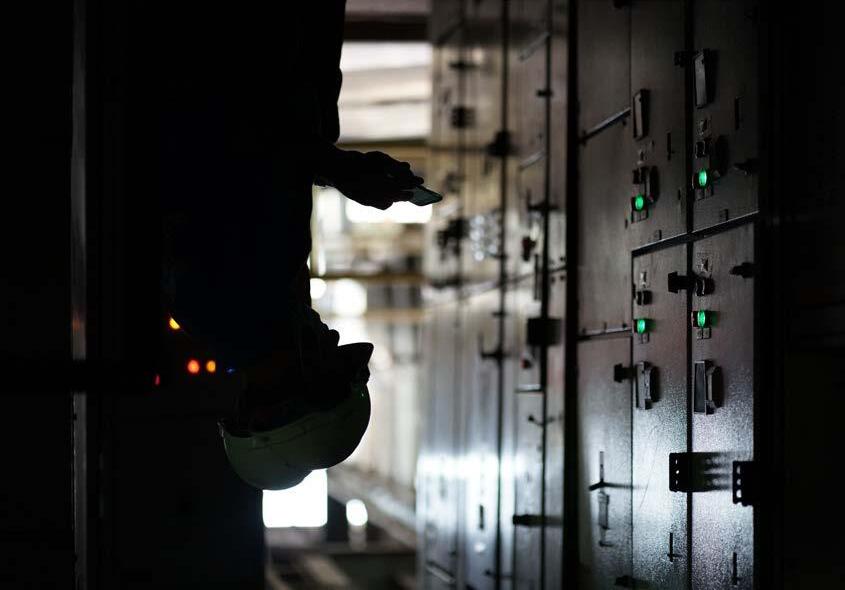
Contact us today and experience the power of our next-generation

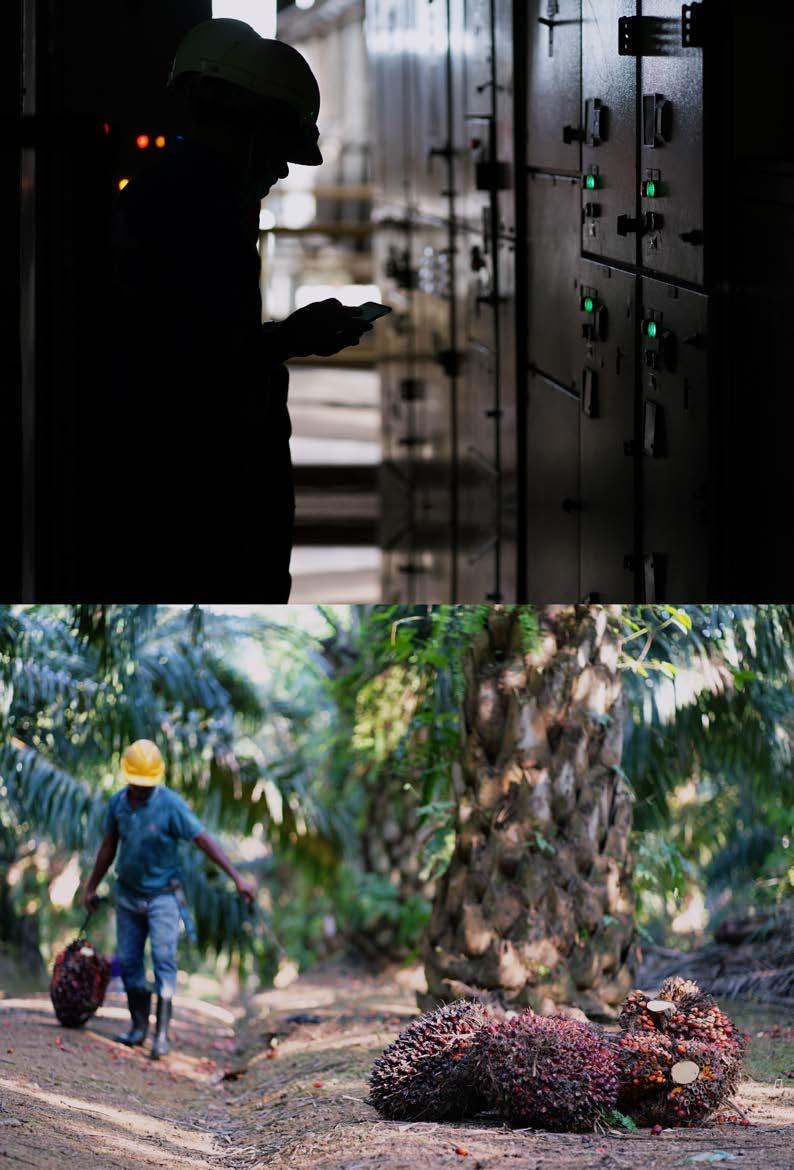

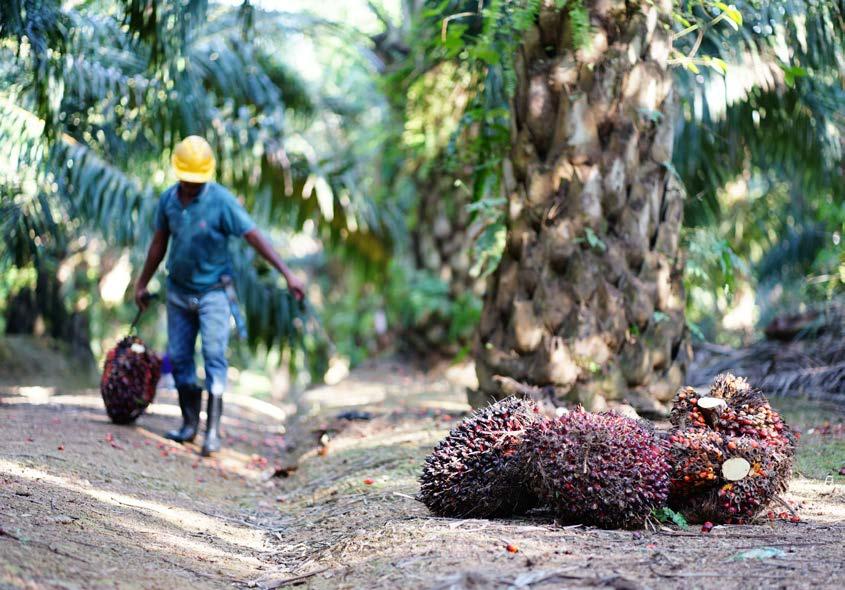

HTTPS://ABS.GLOBAL
Revolutionize Palm Oil Bussines With Real-Time Insights & Actions Informed Decisions, Competitive Advantage
EU Palm Oil Ban: Malaysia, Indonesia Seek Trade Justice

A WTO panel’s ruling on the EU’s palm oil import policy has intensified trade tensions with Malaysia and Indonesia, highlighting environmental and trade rule disputes.
A World Trade Organization (WTO) panel ruled earlier this month on a complaint brought by Malaysia against the European Union over the bloc›s plans to phase out the import of palm oil as biofuel because of environmental concerns.
Malaysia, the world’s second largest producer of palm oil after Indonesia, brought a case to the WTO in early 2021 against the EU, France and Lithuania.
The Southeast Asian country contested that the EU had violated international trade rules in its policy to phase-out the import of palm oil as a biofuel due to deforestation and emissions risks under the EU’s second Renewable Energy Directive (RED II).
Indonesia also filed a case with the WTO but asked for it to be suspended a day before the result of Malaysia›s case was announced.
What was the WTO decision based on?
The three-person panel voted by two-to-one in favor of the EU’s ability make rules against imports of crop-based fuels for environmental reasons.
However, it also said that the EU was at fault for how it had prepared and published its policy, which amounted to “arbitrary or unjustifiable discrimination” against Malaysia.
Much of this revolved around how the EU defined its assessment of emissions, along with indirect land use change (ILUC), which measures the impact of diverting agricultural land previously designed for food production to biofuel production,
The WTO panel found the EU’s study on the ILUC risk of palm oil, using data from 2008 and 2016, was potentially outdated.
It also said an arbitrary choice was made to assess emissions from palm oil production over a 10-year period, when palm trees usually survive for up to 30 years.
ASIA PALM OIL MAGAZINE | Apr-Jun 2024 26 INDUSTRY NEWS

Malaysia is the world’s second largest producer of palm oil after Indonesia. Image: Wahyudi/AFP via Getty Images
“There are deficiencies in the design and implementation of the low ILUC-risk criteria,” the WTO panel noted in a 348-page report published on March 5.
EU relations with Malaysia, Indonesia at risk
One dissenting panelist also offered greater support to Malaysia’s appeal that the EU policy is protectionist, since it is accused of singling out palm oil while overlooking the environmental impact of biofuels produced within Europe, such as rapeseed.
Palm oil in high demand, but unsustainable
Chris Humphrey, executive director of the EU-ASEAN Business Council, said that the WTO ruling will be “viewed by both the EU and Malaysia as a victory given the mixed outcome.”
“While we await the delayed WTO ruling on Indonesia’s complaint on palm oil, it is clear that dialogue between the EU and these key ASEAN partners is the only way forward in dealing with the concerns that both Indonesia and Malaysia have,” he added.
The EU Directorate-General for Trade said in a statement that the bloc “intends to take the necessary steps to adjust the Delegated Act.”
The European Commission did not respond to requests for comment.
Daniel Caspaty, an MEP and chair of the European Parliament’s committee on relations with ASEAN states, told DW that the WTO panel’s findings “marks a significant moment in the debate on trade policy and environmental protection.”
“This decision will undoubtedly have implications for the EU’s relations with Indonesia and Malaysia, particularly concerning the palm oil dispute,” he added.
Caspaty said Europe must urgently find a resolution, as well as with other conflicts such as discussions surrounding nickel.
Reactions to WTO verdict
Malaysia’s government responded to the WTO verdict as though it had emerged victorious.
Abdul Ghani, Malaysia’s minister of plantation and commodities, called it a “vindication” of Kuala Lumpur’s “pursuit of justice” for its palm oil sector.
Speaking to local media, he argued that the WTO ruling “clearly finds fault with the EU’s rules on indirect land use change to ban palm oil biofuels,” adding that it “also finds fault with the EU’s approach to notifying and consulting with other economies when introducing new trade measures.»
ASIA PALM OIL MAGAZINE | Apr-Jun 2024
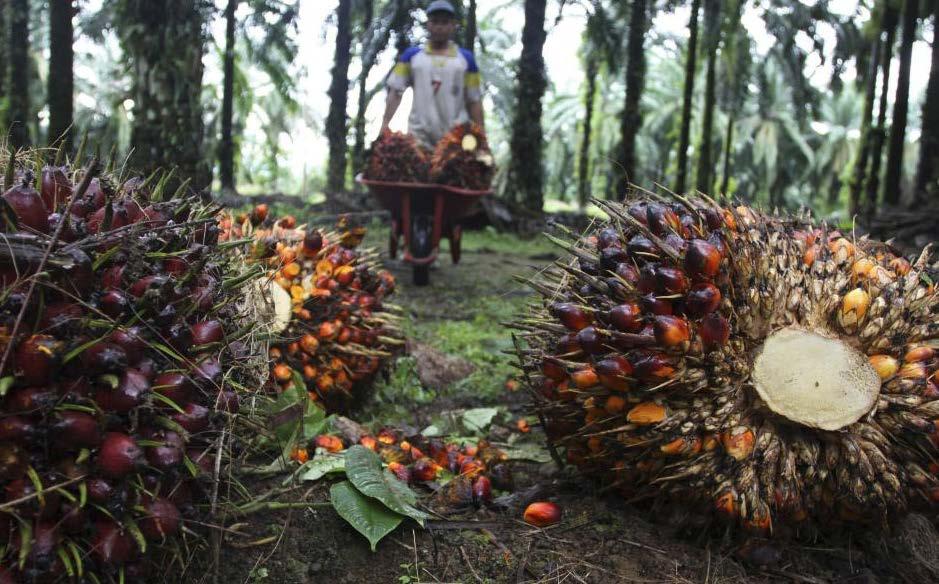
Indonesian policymakers, meanwhile, will take “cold comfort from headlines celebrating the ruling about discrimination,” said Jakarta-based analyst Kevin O’Rourke from the consultancy Reformasi Information Services.
It remains to be seen whether Indonesia’s president-elect, Prabowo Subianto, will alter Jakarta’s stance around this issue when he enters office later this year.
Humphrey from the EU-ASEAN Business Council said he now hopes “the ruling draws a line under the dispute,” and that the EU, Malaysia and Indonesia can now focus on working out their differences through the ad-hoc joint task force setup last year.
The task force last met in February and is expected to reconvene for more talks in September in Brussels.
EU should set ‘realistic’ standards for other countries
The EU is nearing the end of free-trade talks with Indonesia and has been in talks with Malaysia about restarting negotiations for a bilateral free-trade pact.
However, Brussels has recently come under attack from more third parties over how it classifies its rules related to deforestation.
For Jakarta-based analyst O’Rourke, greater clarity can benefit Indonesia and Malaysia.
“Unlike some of their competitors, the two nations are able to achieve compliance in many instances and that will constitute a form of competitive advantage over the long term. And, of course, without such rules, climate change will imperil these as well as all other countries,” he said.
This is likely to require the EU to alter how it approaches trade with partners.
Frederick Kliem, a research fellow and lecturer at the S. Rajaratnam School of International Studies in Singapore, said Brussels currently applies “a very detailed, highly bureaucratic approach to such matters.”
“This is OK internally, where the EU is well understood, appreciated and policies are well communicated. This is, however, not the same for third parties,” he added.
“If the EU does not moderate its high standards and make them more realistic for third parties to achieve, I fear it will be very difficult to achieve further free trade agreements.”
ASIA PALM OIL MAGAZINE | Apr-Jun 2024 28
INDUSTRY NEWS Source: www.dw.com
Customer: Palm Oil Producer with excess fuel.
Challenge:
Generate power for a factory far off the grid.
Result:
Elliott steam turbine generators produce reliable, renewable on-site electricity.
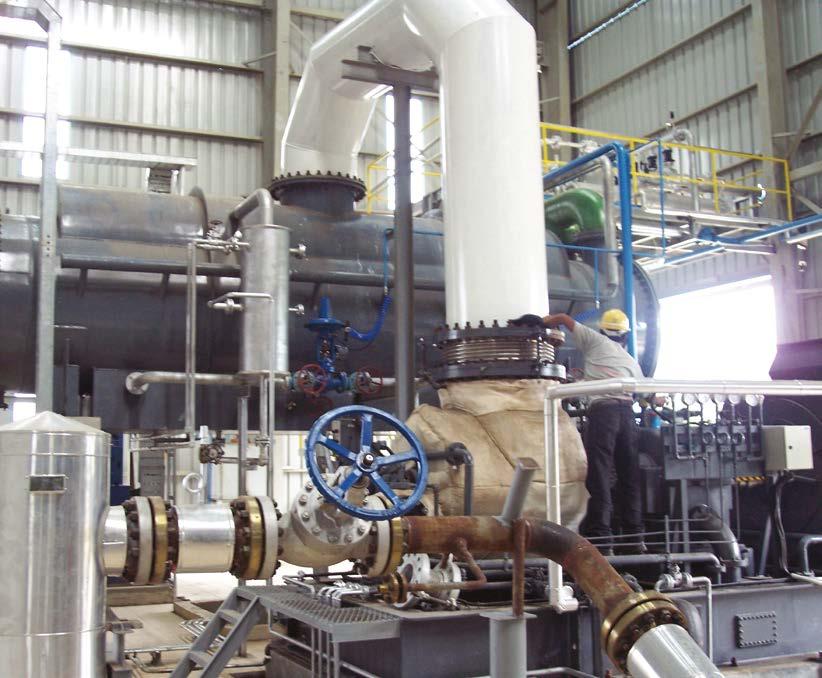
They turned to Elliott
to generate power and reduce their environmental footprint.
The customer turned to Elliott to develop a flexible energy plant for two palm oil mills using empty fruit bunches as fuel. Elliott’s steam turbine generators provide 7000 kWe of low-cost, clean, renewable electricity, enough to power the entire industrial estate. Who will you turn to?



COMPRESSORS n TURBINES n GLOBAL SERVICE www.elliott-turbo.com/Plant-Oils
The world turns to Elliott.
Independent Smallholders Can Form Larger Clusters to Bolster Malaysia’s Palm Oil Output: Johari Ghani
The Ministry of Plantations and Commodities intends to unite independent oil palm smallholders into larger clusters in a bid to bolster the country’s palm oil production.
Its minister Datuk Seri Johari Abdul Ghani outlined that the adoption of the oil palm smallholder cluster model is anticipated to augment the country’s yield, projecting nearly nine million fresh fruit bunches (FFB) and 1.8 million tonnes of crude palm oil (CPO) per 10,000 hectares of oil palm plantations.
Explaining the concept further, Johari illustrated: “If each independent smallholder has four hectares, we gather them all into a cluster in one area, and (if) we can reach 10,000 hectares, then we can apply good plantation management practice so that the yield of each hectare can increase.”
Johari was responding to Senator Tan Sri Mohamad Fatmi Che Salleh on the opening of new plantations to increase the country’s oil palm yield, while wrapping up the debate on the Motion of Thanks for the Royal Address in the Dewan Negara, Bernama reported.
He also emphasised the ministry’s focus on replanting programmes, particularly when trees reach 25 years of age, following a precedent set by the private sector.
Johari also noted that Malaysia does not have enough land to explore new plantation sites.
Highlighting the challenge of land scarcity, he underscored: “We only have 5.7 million hectares for palm oil. We are faced with a standard guideline that is imposed on countries that produce ‘edible oil’, which is that any palm oil intended for export must come from land that has been forested before 2020.
“If not, we will be considered a country that does not take into account the issue of deforestation and interferes with the export of palm oil abroad.”
Johari has urged both industry stakeholders and smallholders to ramp up the production of FFB and CPO to ensure the continued prominence of the Malaysian palm industry.
He indicated that the government’s strategy would prioritise enhancing yields rather than opening up new plantation areas.

Key factors essential to achieving these targets include adhering to the appropriate replanting schedule, typically at a rate of four to five per cent, ensuring an adequate workforce and implementing effective farm management practices.
Additionally, the ministry is advocating for the adoption of mechanisation in various tasks such as arranging fronds and FFB, collecting loose fruits, and transporting FFB to the roadside.
ASIA PALM OIL MAGAZINE | Apr-Jun 2024 30
Source: www.nst.com.my INDUSTRY NEWS
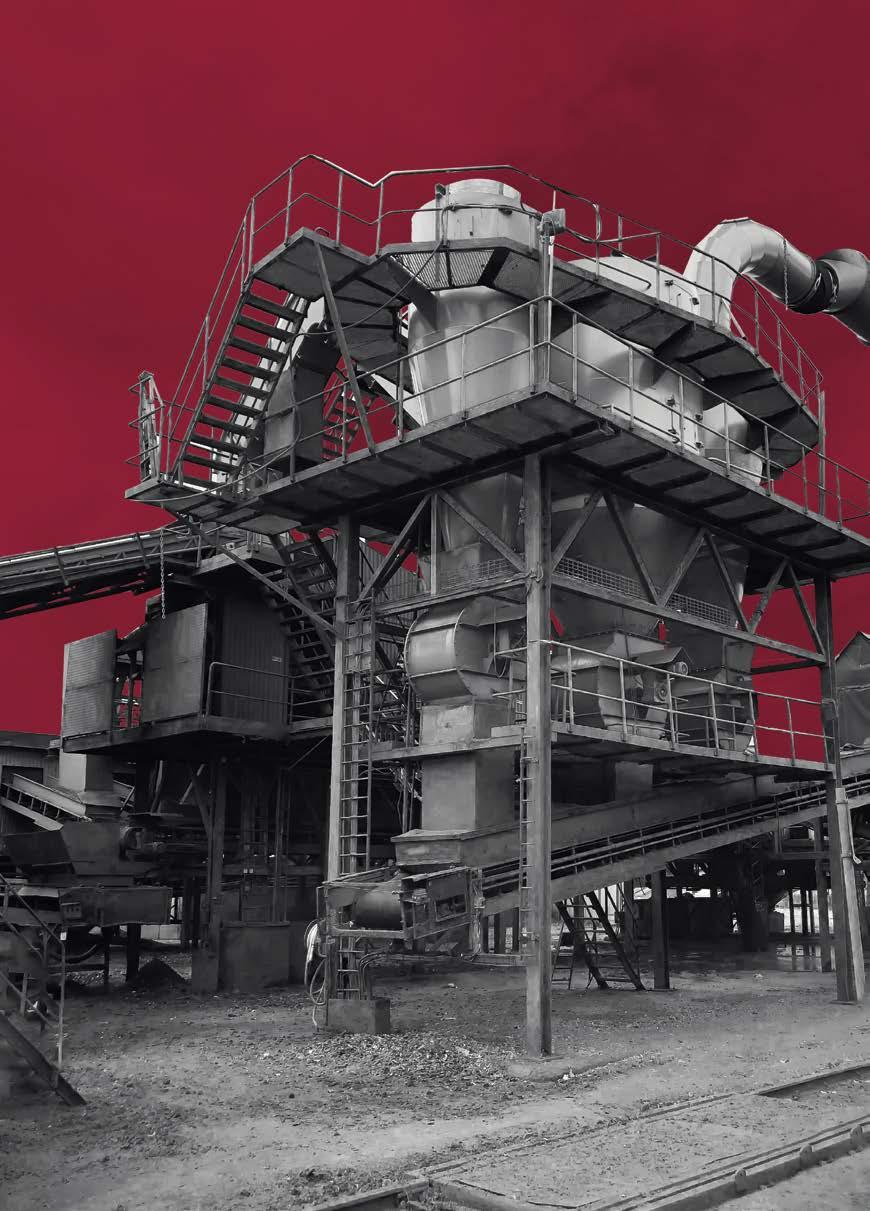
Don’t be surprised by unexpected corrosion in your palm oil production. Secure your equipment’s service life with Hardox® HiAce. This Hardox® steel grade is developed specifically for acidic and corrosive wear environments. Hardox® HiAce can extend service life by up to 3 times compared to a conventional AR400 steel. Learn more at www.hardox.com Contact Mr John Kuan, Area Sales Manager SSAB Malaysia & South East Asia +6019 754 3928 Or Email: john.kuan@ssab.com

Helping Palm Oil Smallholders Navigate EU Rules
One of the challenges to Malaysia’s palm oil industry is that of scale and fragmentation. The recent announcement by the Plantation and Commodities Ministry of consolidating smallholder farmers is the first step towards improving productivity and yields.
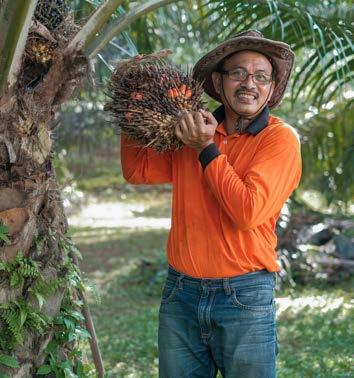
Minister Datuk Seri Johari Abdul Ghani said recently the ministry was consolidating independent palm oil smallholders to manage land more effectively to ensure timely replanting for consistent and maximum yields.
The move could not be timelier as Malaysia manoeuvres the European Union’s Deforestation Regulation (EUDR), which becomes applicable on Dec 30. The EUDR seeks to address, particularly the issue of palm oil production and filtering imports into the bloc.
Currently, smallholders manage 27 per cent of the total oil palm planted area and the lack of scale poses challenges in optimising their yield count. With guidance from larger corporations, smallholders could increase the country’s crude palm oil production by another 600,000 tonnes a year, without any additional land use.
Consolidation into clusters can be managed more similarly to medium or large estates and will increase capacity among smallholders, ensuring that they can navigate regulatory hurdles, certification processes and transparency and traceability considerations that may be encountered while complying with sustainability requirements.
Consolidation could also result in greater efficiency, leading to higher yields and income. Despite the benefits, smallholder farmers face bigger challenges as the EUDR remains a contentious issue.
One of the thorniest issues is the mandate to importers to verify that there is no deforestation involved in their supply chains. The burden of proof now rests on producers of palm oil, including smallholders, to show that they have adhered to strict sustainability standards.
Satisfying this burden will increase reporting and compliance costs, while the inability to do so regularly might result in their exclusion from the lucrative European market.
There are further concerns over the EUDR’s categorisation of “high-risk deforestation countries”. If Malaysia is classified as one, smallholders might not only lose market access but also risk falling deeper into poverty.
While the EUDR’s intentions are perhaps commendable, it is crucial to consider the implications for and context of smallholders in Malaysia. These individuals are often the lifeblood of rural communities and their earnings may be below the national poverty line.
Meeting the EUDR’s stringent reporting measures – even for the sake of sustainability – could affect the economic viability of small oil palm plantations and consequently, their ability to make a living.
In short, there is now friction in Malaysia’s palm oil industry – between the EU’s definition of sustainability and smallholder livelihoods, green concerns and economic empowerment, and environmental stewardship and social justice.
ASIA PALM OIL MAGAZINE | Apr-Jun 2024 32 INDUSTRY NEWS
Nonetheless, smallholders have not been passively accepting such regulatory pressures. In a display of unity, a group of smallholders have petitioned the EU to apply changes to the deforestation rule, highlighting their circumstances and urging for a more nuanced approach.
Their petition, however, should not imply that smallholders’ palm oil is any less sustainable as Malaysia is already making
Third, there are grants and funding aimed at helping smallholders produce higher-quality fruits, consequently contributing to the sustainability of their supply.
Nonetheless, as the challenges posed by the EUDR remain unresolved, Malaysia’s consolidation of smallholders is a pivotal first step towards ensuring that they are not unfairly disadvantaged when confronted with the regulations.














Two Ministries to Join Forces to Drive Innovation in Palm Oil Sector
The Ministry of Agriculture and Commodities (KPK) will collaborate with the Ministry of Science, Technology and Innovation (MOSTI) to promote various innovations, automation, and mechanization in the country’s palm oil industry.
In a post on X (formerly known as Twitter), KPK Minister Datuk Seri Johari Abdul Ghani said the agreement was reached following discussions with Minister of Science, Technology, and Innovation, Chang Lih Kang yesterday regarding the advancement of technology for palm oil harvesting.
“Therefore, we welcome MOSTI, researchers, technology entrepreneurs, and other stakeholders in this ecosystem to innovate and adapt advanced technology to assist the Malaysian palm oil industry,” he said.
Meanwhile, Chang, through a post on his official Facebook account, expressed MOSTI’s commitment to offering suitable technology and innovation to address the challenges faced by Malaysia’s palm oil industry, particularly in the harvesting process.
He said that the palm oil industry, which is one of the main contributors to the country’s economy, is facing labor shortage, resulting in a significant estimated income loss of between RM20 billion and RM30 billion.
“I am confident that through close collaboration between MOSTI and KPK, and with the support of all stakeholders, we can lead the development of technology that will enhance the efficiency and competitiveness of our country’s palm oil industry,” he said.
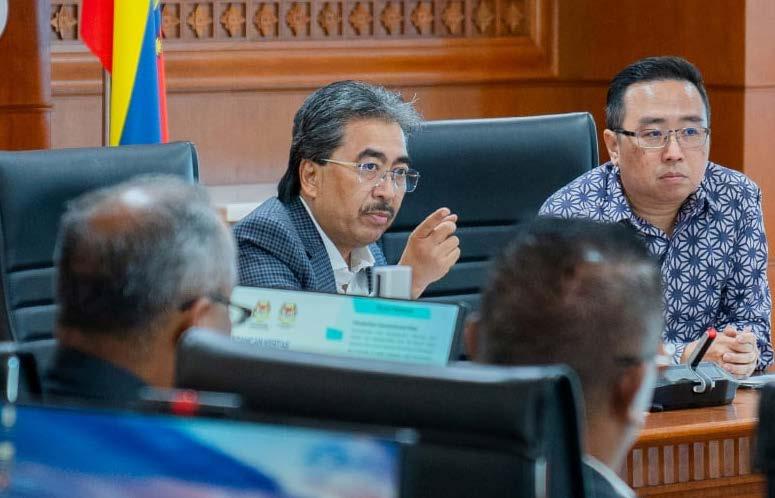
In a post on X (formerly known as Twitter), KPK Minister Datuk Seri Johari Abdul Ghani said the agreement was reached following discussions with Minister of Science, Technology, and Innovation, Chang Lih Kang yesterday regarding the advancement of technology for palm oil harvesting. - Pic courtesy from Datuk Seri Johari Abdul Ghani X (Twitter)
ASIA PALM OIL MAGAZINE | Apr-Jun 2024 34 INDUSTRY NEWS
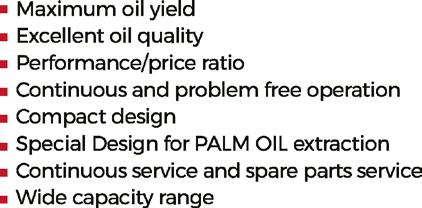
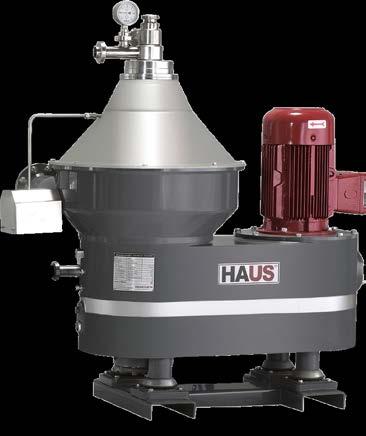





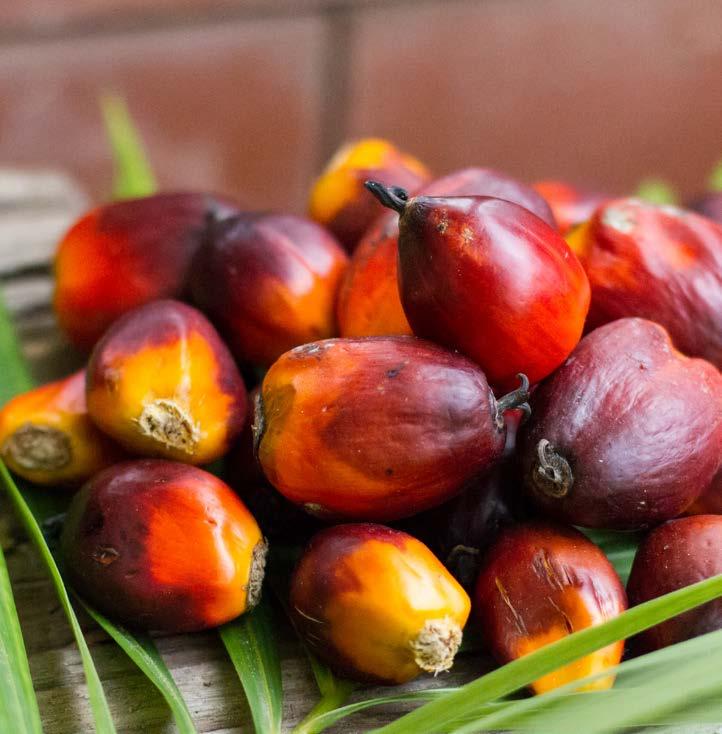
IIndia’s Palm Oil Imports Plunge as Demand for Sunflower Oil Jumps
ndia’s palm oil imports plunged to their lowest level in nine months in February, as higher prices prompted buyers to reduce purchases of the tropical oil in favor of rival sunflower oil, according to a leading trade body.
Lower purchases by India, the world’s biggest importer of vegetable oils, could cap a rally in benchmark Malaysian palm oil futures, but will help to reduce sunflower oil inventories in the Black Sea region.
Palm oil imports in February fell about 36% from the previous month to 497,824 tonnes, the lowest since May 2023, the Mumbai-based Solvent Extractors’ Association of India (SEA) said in a statement.
“The availability of palm oil for edible oil requirements has come down as the main two producers Malaysia and Indonesia
are diverting it for the production of biodiesel. This may result in an increase in prices this year,” SEA said.
On the flip side, sunflower oil imports in February jumped about 35% to 297,092 tonnes on lower prices and as shipments originally expected in January arrived in February due to delays caused by Houthi attacks on Red Sea shipping lanes, it said. However, soy oil imports in February slipped 8% from a month ago to 172,936 tonnes and were far below the monthly average imports of 306,000 tonnes in the marketing year ended Oct 31.
That combined with the drop in palm oil imports pulled down India’s total edible oil imports in February to the lowest level in nearly two years at 0.97 million tonnes, SEA said.
ASIA PALM OIL MAGAZINE | Apr-Jun 2024 36 INTERNATIONAL NEWS
Source: www.thestar.com.my
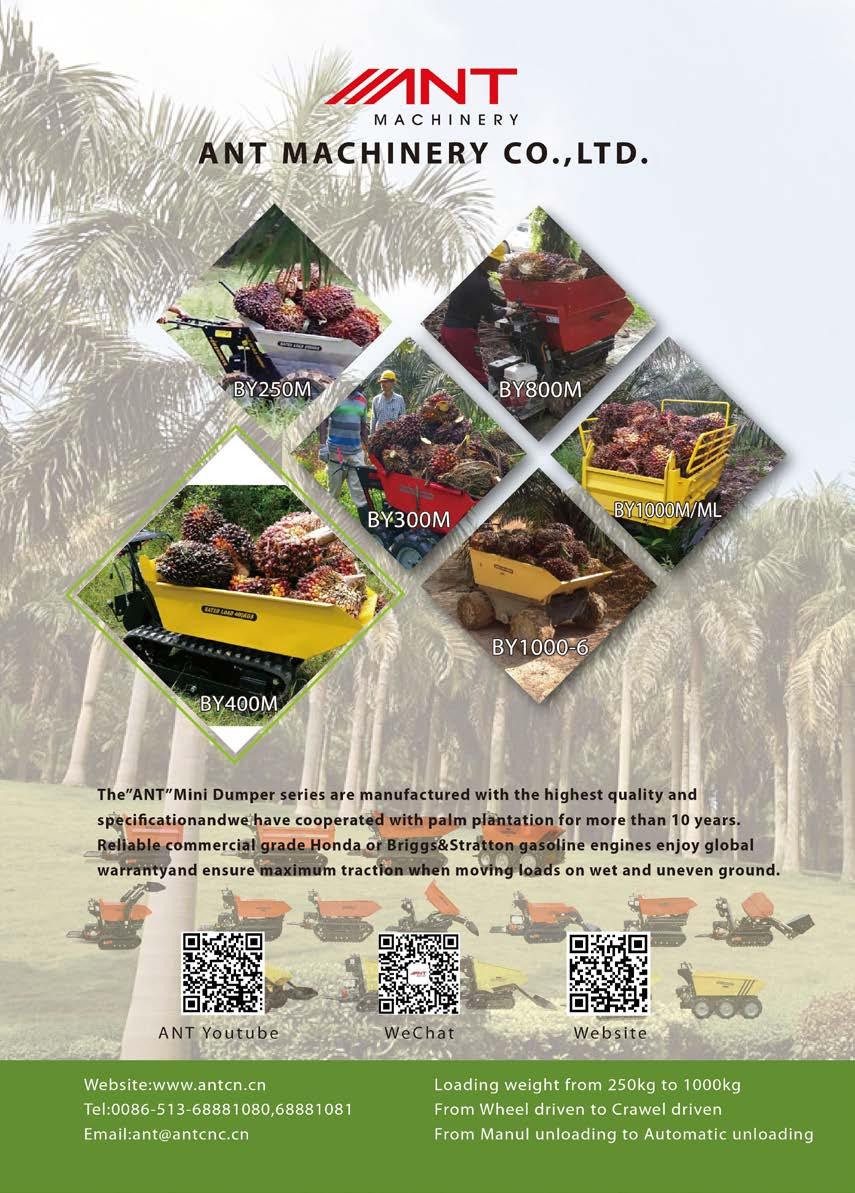
Malaysian Palm Oil Board Starts Trial for Biofertiliser
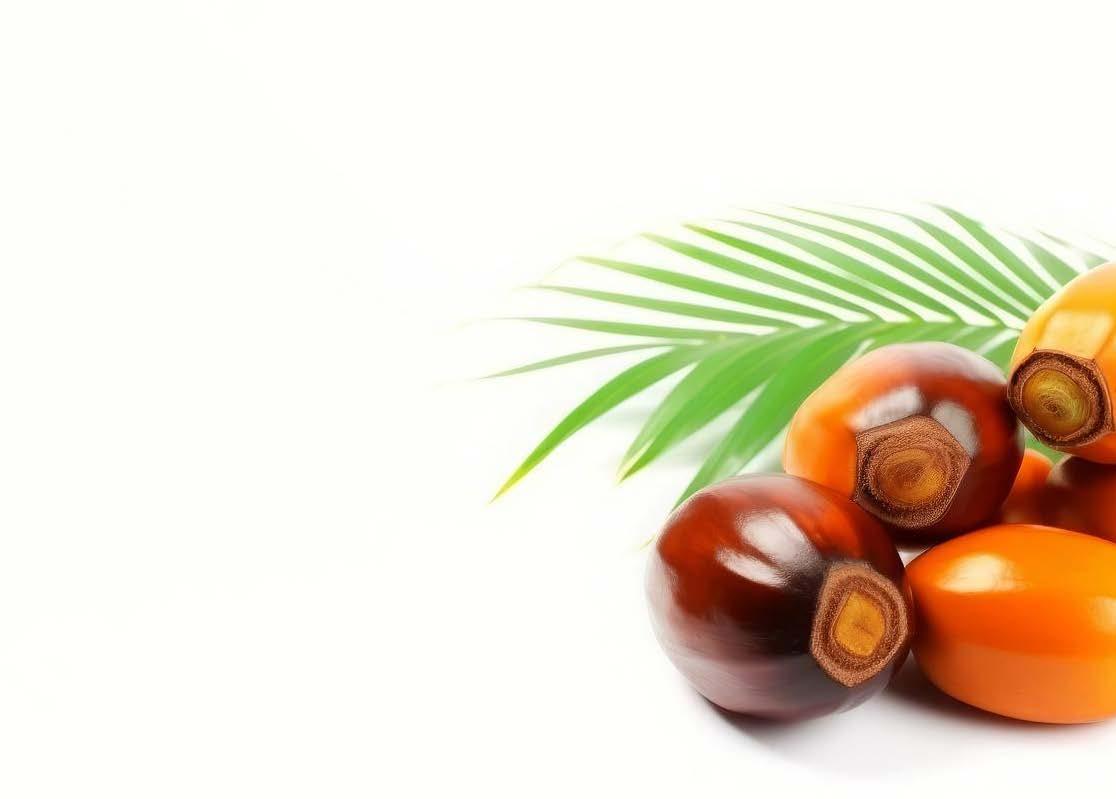
The Malaysian Palm Oil Board (MPOB), in collaboration with IBG Manufacturing Sdn Bhd, has commenced the trial for its latest innovative solution, the iM-bioGuard biofertiliser.
MPOB said in a statement here today that infused with the potent bacteria Pseudomonas, this biocontrol fertiliser combats the fungal pathogen Ganoderma boninense, which is the cause of the Basal Stem Rot (BSR) disease.
Also known as the “cancer” of oil palm, BSR is one of the most severe diseases afflicting oil palm estates in major producing countries, particularly in Malaysia and Indonesia, resulting in enormous economic losses of RM1.5 billion each year, it added.
The MPOB patented technology - iM-bioGuard is the first liquid type of biofertiliser that is designed to cater for easy absorption by the oil palms, making it possible to significantly reduce the damage caused by the Ganoderma disease.
During a recent visit to Machap Estate for its demonstration, Deputy Plantation and Commodities Minister Datuk Chan Foong Hin said the introduction of iM-bioGuard represented a significant milestone in their collective efforts to mitigate the devastating effects of Ganoderma on the oil palm industry.
“I hope that by starting the first trial with United Malacca Bhd (UMB), it can help to increase crop resilience while promoting environmentally sustainable practices,” said Chan.

The Malaysian Palm Oil Board (MPOB), in collaboration with IBG Manufacturing Sdn Bhd, has commenced the trial for its latest innovative solution, the iM-bioGuard biofertiliser.
On top of that, MPOB and IBG Manufacturing have signed a commercial agreement to introduce the technology to the industry, of which this collaborative endeavor signifies a united front in advancing sustainable practices and safeguarding the future of Malaysia’s oil palm industry.
ASIA PALM OIL MAGAZINE | Apr-Jun 2024 38 GREEN SOLUTIONS
Source: www.nst.com.my
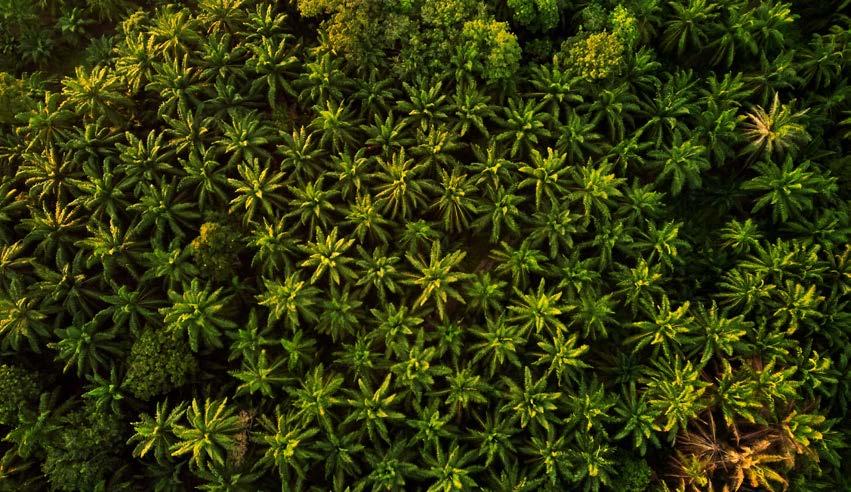













Brought To You By : Endorsed and Suppor ted By : Join the World's Largest Palm Oil Event at the Heart of the Industry! 10th INDONESIA INTERNATIONAL PALM OIL CONFERENCE 2024 Incorporating : 2024 Santika Premiere Dyandra Hotel & Convention Medan - Indonesia 09 - 11 OCTOBER 2024 HIGHLIGHTS OF THE EVENT www.palmoilexpo.com INDUSTRY NETWORKING LUNCH INTERNATIONAL CONFERENCE TECHNOLOGY SEMINARS PLANTERS' FORUM info@fireworksid.com +62 21 5088 2917 +62 812 7562 8281
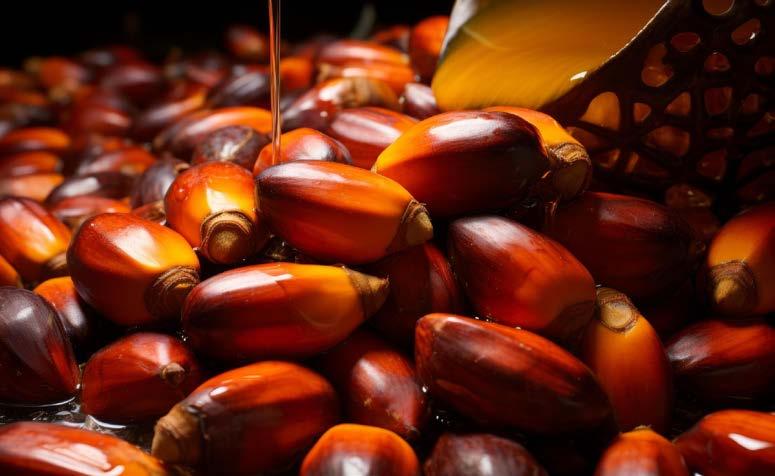
Growing Greener Commodities –One District at a Time
It’s often said that it takes a village to raise a child. What does it take to raise the sustainability of agricultural commodity production? As it turns out, something similar.
Research by the Center of International Forestry Research and World Agroforestry (CIFOR-ICRAF) shows promising results from taking a jurisdictional approach to increasing the sustainability of palm oil plantations in four districts/regencies in Indonesia: Pulang Pisau (Central Kalimantan Province), Kutai Kartanegara (East Kalimantan Province), Pelalawan (Riau Province), and Sintang (West Kalimantan Province).
A jurisdictional approach engages actors across different levels. It fosters collaboration by facilitating dialogue among stakeholders such as communities, the private sector, NGOs, academia, and government. The approach seeks to draw out these parties’ voices and find synergies between their interests, whilst taking the local context and its particular challenges into consideration. Local government – especially its leadership –also plays a central role. “The willingness and policies of the local government are critically important, since they are the ones who have the budget and create regulations,” said CIFORICRAF senior scientist Herry Purnomo.
The research also provides input to district action plans for boosting palm oil sustainability, and emphasizes ways to reduce deforestation and emissions across the supply chain. It offers a roadmap to transform and increase the productivity of oil palm plantations and improve smallholder farmers’ incomes.
According to Purnomo, the key to successfully conducting a jurisdictional approach lies in a sense of trust between stakeholders and local government, as well as having a shared goal. In the case of palm oil sustainability, the stakeholders in the study areas shared a common interest in complying with the European Union’s new regulation on deforestation-free products (EUDR) to ensure they can continue to export their products to the EU market.
Hendrik Segah, a senior researcher at the University of Palangkaraya, shared promising progress in Kutai Kertanegara, where there has been an increase in certification for smallholder farmers submitted by district leaders. “The local government is also trying to speed up the certification process to protect peatland conservation areas,” he said. “This is supported by communities, local NGOs, and the private sector.”
Despite the challenges, Purnomo and Segah expressed optimism that the local governments involved in the study are on the right path toward sustainability in agricultural commodity production. Their work going forward—to strengthen data and coordination, facilitate dispute handling, and increase farmers’ capacity—is more urgent than ever, said Purnomo. “Indonesia is the world’s leading producer of palm oil. Now, we need to work to make sure Indonesia is taking the lead in sustainability as well. It is also mandated in our constitution,” he said.
ASIA PALM OIL MAGAZINE | Apr-Jun 2024 40
GREEN SOLUTIONS
Source: forestsnews.cifor.org
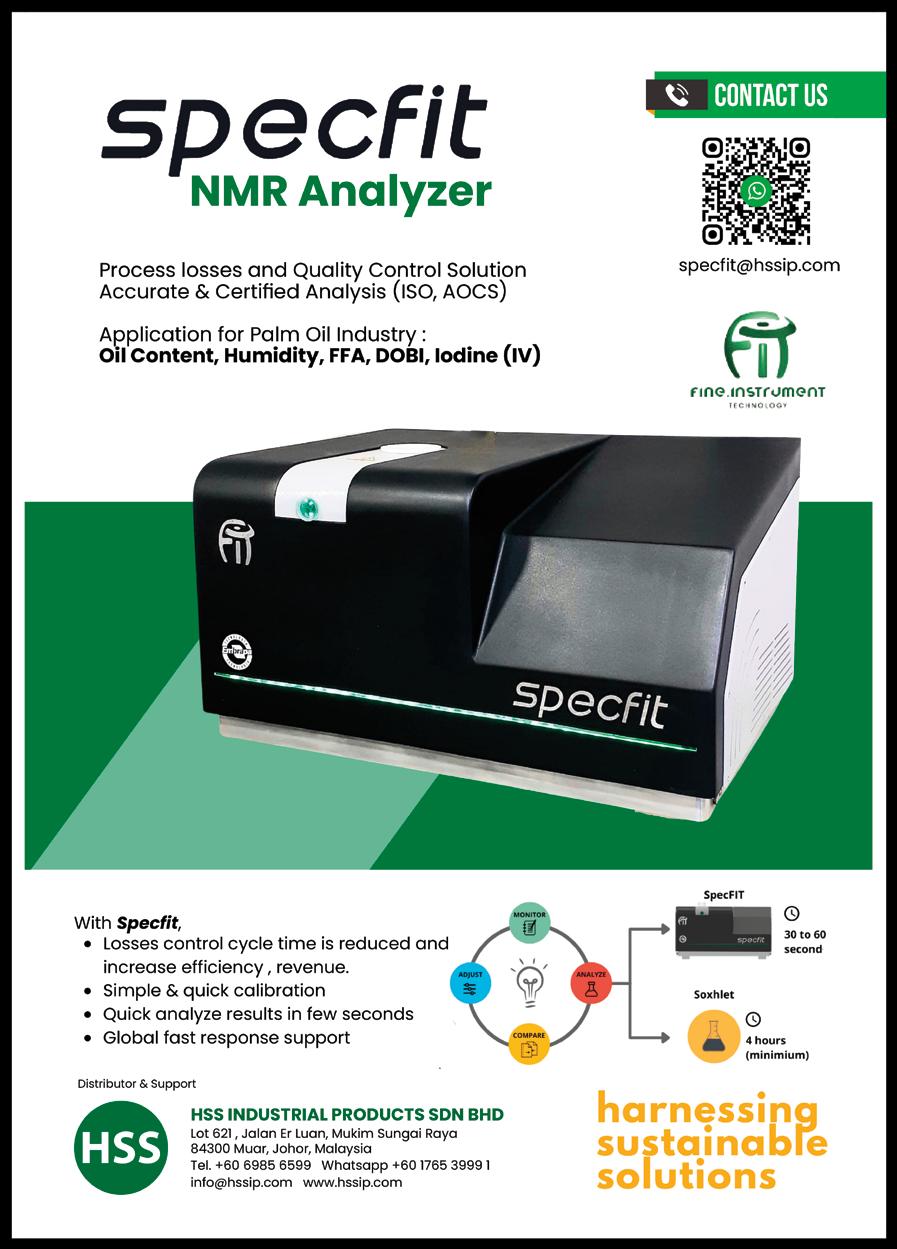

Enhancing Palm Oil Milling Efficiency with SpecFIT: A Game-Changer in Process Control and Quality Management
In the vibrant landscape of Brazilian technology, FIT - Fine Instrument Technology - stands out as a key player. Established in 2005, FIT specializes in developing and selling cutting-edge equipment and solutions for agribusiness, industries, and research centers, with a focus on Nuclear Magnetic Resonance (NMR) technology. Headquartered in São Carlos, the epicenter of technology in Brazil, FIT proudly introduces its flagship creation – the SpecFIT spectrometer.
Released in 2015, SpecFIT marked a significant milestone for FIT, being the first 100% Brazilian spectrometer utilizing Time Domain Nuclear Magnetic Resonance (TD-NMR) technology. Initially targeted for research centers, SpecFIT revolutionized process control in palm oil extraction after the release of
the solution to measure oil content in fruits and extraction residues. However, its success prompted the exploration of new applications, showcasing FIT’s commitment to continuous innovation and now it is well known in different areas of oil and fats, malt and beer, and soil among others.
A chronological evolution unfolds as FIT strategically shifts its attention to agribusiness and the food industry since 2016. The development of the Agri version of SpecFIT, in partnership with Embrapa (Brazilian Agricultural Research Corporation), a governmental company with 40 units spread through Brazil focused on the development of agriculture from new crops to new technological equipment including heavy types of machinery with AI and nanotechnology. All this knowledge together
ASIA PALM OIL MAGAZINE | Apr-Jun 2024 42 TECHNOLOGY AND PRODUCT NEWS
with an aim for quality and a diverse team FIT of engineers, physicists, chemists, and specialists, ensured a tailored approach to meet clients’ needs and resulted in lab equipment that not only brings information but is also very user-friendly to use that workers from all kind of levels and industry can use to bring information to optimizing processes and enhancing quality control in research centers and industries.
FIT’s international expansion has been remarkable, expanding its footprint to over 20 countries, serving customers and clients in Latin America, North America, Asia, Oceania, and Europe across various sectors of industry aiming to reach Africa this year. The vegetable oil sector, particularly in controlling losses during the extraction of palm oil and other oilseeds, emerges as one of FIT’s primary areas of influence. The biggest differential of the company is the care with the customer pre and after sales.
Central to FIT’s success is its magnetic resonance-based method, offering a fast and accurate solution. Discovered in 1938, the physical effect of magnetic resonance has 6 Nobel prizes works and has been applied in three different ways: imaging, well known from the medical exams, spectroscopy, and time-domain, where the crude NMR signal is related to physical-chemical parameters of the sample. Time domain nuclear magnetic resonance (TD-NMR) coupled with userfriendly software is the base of SpecFIT technology, which also has 4.0 tools like data analysis and cloud services. Using SpecFIT data, the user can improve can enhance productivity without the need for extensive plantation. The star product, SpecFIT, efficiently measures oil content in extraction residues within seconds. The software, designed for ease of use even
for non-experts, automatically generates results and provides a dashboard via the cloud to decision-makers. Accredited by international standards ISO, AOCS, and ASTM, SpecFIT caters to various industries, identifying potential problems and providing crucial information for decision-making.
The application of TD-NMR to measure oil content is ISO certified, ensuring accuracy and trustful data when applied to measure extraction losses. This is possible because the dependence between the intensity of the resonance signal and the oil mass inside the sample is direct and linear, resulting in a stable and linear calibration curve that can be generated with less than 10 samples. The fast technique that competes with NMR in process control applications is the near-infrared (NIR), which uses the light detected from the spread of the light beam that reaches the sample. This signal is not directly dependent on the oil content many characteristics besides the oil content of the sample can affect the spread of the light bean like shape, color, moisture, and temperature among others. Because of the large number of facts that influence the results, the calibration curve uses chemometrics calibration methods, normally partial least square (PLS) regression, a statical method based on eigenvalue and eigenvector that correlates the signal with the reference results of the same sample. As bigger the interference in the signal, the bigger the number of points required to create a calibration curve. In the case of oil content in the palm oil extraction process, NIR requires at least 200 points to create a good calibration curve. A point in a calibration curve for oil content is a signal with oil content result done by Sohxlet. This means 200 Sohxlet analyses (800 hours considering 4 hours per sample). Another important point is a NIR calibration curve
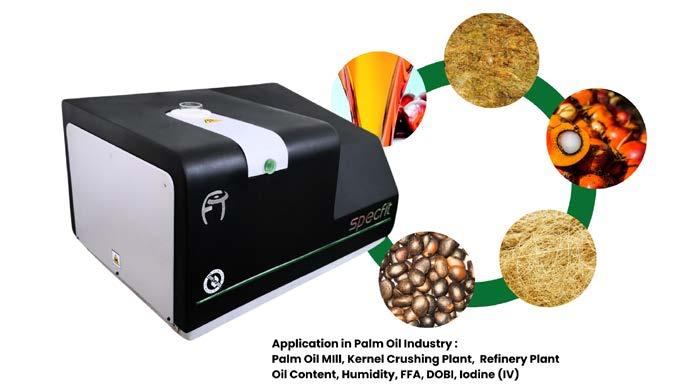
ASIA PALM OIL MAGAZINE | Apr-Jun 2024
requires maintenance. For the same reason, the curve needs a big number of points to be created adding the fact of degradation of the lamp, the curve needs to be always fed by new points to keep the stability and accuracy of the results. This fact made the method using NIR to measure oil content not ISO certified and not trustful in time without great attention to the curve. The fact that you do not need to dry the sample looks like an advantage in the beginning, but summing up all the advantages that even the moisture has part of it is resulting in a movement where NIR users are moving to NMR.
When compared to Soxhlet, SpecFIT also presents numerous benefits. Soxhlet is known for its extreme dependence on analysts, with results often being unstable within industrial settings. Additionally, Soxhlet employs carcinogenic solvents, increasing risk within laboratories, and taking at least 4 hours for loss analyses. In most cases, however, results only reach decision-makers the following day, hindering quick decisionmaking.
With SpecFIT, analyses become much more independent of analysts, as they only need to click a button to generate results. Oil content analyses take about 30 seconds, and the results are digital, allowing information to reach decision-makers in a matter of minutes, thus enabling quicker action on processes.
In a study conducted by the manufacturer of SpecFIT to determine the capability of NMR as a substitute for Soxhlet, samples from 10 palm oil mills were analyzed using both technologies, NMR and Soxhlet. Approximately 250 samples were analyzed, with each sample being analyzed at least three times to identify the stability of results from both technologies. This study found that 15.5% of experiments conducted with Soxhlet showed analytical errors, compared to only 2.5% of experiments conducted with NMR, proving NMR a better technique for process control.
The same study identified a high correlation between SpecFIT and Soxhlet techniques, with a potential correlation exceeding 83%, for a test power greater than 95% on the same set of samples.
Another study, conducted by a SpecFIT user in Brazil, selected two analysts to analyze the same homogeneous sample over three days, always in duplicates, using both techniques. This study also highlighted Soxhlet errors in the industry and the result stability of SpecFIT, approving only the NMR technology for process control analyses.
Therefore, with NMR we have a faster installation, more reliable results over time, and full data connectivity, making it possible to analyze all extraction samples and mesocarp for oil potential calculations. Fine Instrument Technology is also the manufacturer of solutions for refineries such as SFC (Solid Fat Content) and continues to develop applications, such as oil content analysis in bleaching earth and analysis of Iodine Value, acidity (FFA), DOBI, and moisture in CPO. FIT provides flexibility to clients with several software applications for SpecFIT, facilitating optimal adaptation to organizational needs. Data obtained can be stored locally or online in a dedicated cloud, ensuring swift, non-destructive analyses with high accuracy and repeatability.
The impact of SpecFIT on companies adopting the technology is significant, with some experiencing a reduction of 33% in losses on clients in Latin America. This payback has attracted major clients. These successes have propelled FIT to capture an impressive 90% of the Brazilian palm oil mills and 40% of the Latin American market in just seven years and now FIT started implementing its solutions for clients in Southeast Asia with big players in the region as customers.

ASIA PALM OIL MAGAZINE | Apr-Jun 2024 44
TECHNOLOGY AND PRODUCT NEWS
Repeatability comparison between SpecFIT and Soxhlet
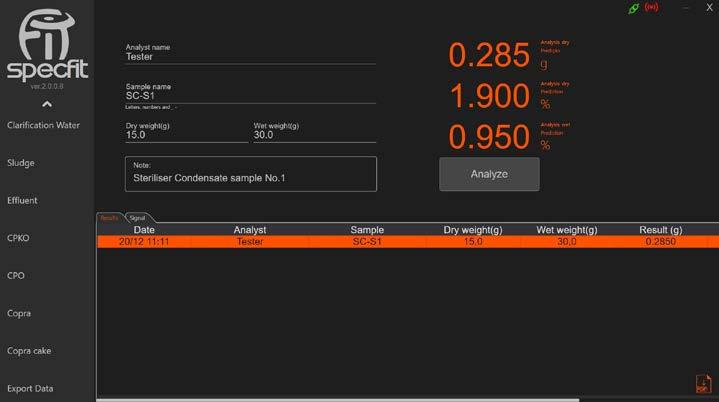
FIT’s journey is not solely about technological prowess; it is equally marked by strategic partnerships and collaborations with companies and research institutions worldwide. These alliances expand FIT’s reach into new markets and facilitate the development of innovative solutions, positioning the company at the forefront of competition.
The commitment to improvement and innovation at FIT is relentless, evident in regular updates and upgrades in hardware, software, and new applications. Collaborations with renowned NMR centers beyond EMBRAPA, such as the University of São Paulo (USP) show FIT’s dedication to staying at the cutting edge of technology, science, and innovation. The CEO, PhD. Daniel Consalter plays a key role in these partnerships. Philosopher and doctor in physics, Daniel specialized in the instrumentation of lab equipment, and developing SpecFIT was part of his formation. Well knowing how important is to keep collaboration between companies and research centers, FIT is well related with not only universities but also business companies with the same commitment to technology and good service as FIT.
The collaboration with the German company LAIX Technologies introduces robotics solutions for automating analysis and thermal baths, ideal for precise analysis, especially for Solid Fat Content (SFC) applications. SpecFIT’s compatibility with automation streamlines readings and procedures, eliminating the need for manual operation. This proves particularly beneficial for industries conducting various analyses, offering time savings, greater reproducibility, precision, and team optimization.
FIT’s new software designed to control losses in the Palm Extraction Process adds another layer of value. Users gain access to dynamic tables, loss data panels, and a control chart, providing a comprehensive view of data associated with different analysis parameters.
Adding to the excitement, FIT is releasing the SpecFIT App this year, a platform initially focused on the Palm Oil Market. This integrated platform, available on web platforms, Android®, and iOS®, provides real-time updates of analyses at each process point, empowering employees to monitor production efficiently and make quick decisions to ensure product and raw material quality. To learn more, interested parties can contact the FIT team and secure a place on the waiting list to purchase the solution.

ASIA PALM OIL MAGAZINE | Apr-Jun 2024
Dr. Daniel Consalter
SPECFIT's user friendly software, available in localize language

MyPalm – TRANSFORMING OIL PALM PLANTATION WITH CUTTING-EDGE TECHNOLOGY
In the dynamic landscape of oil palm plantations, traditional methods are facing a wave of transformation fueled by technological advancements, especially in the realm of data analytics. Despite these advancements, challenges continue to impede the efficiency and profitability of plantation operations. This article delves into the persistent obstacles encountered by plantation managers and introduces MyPalm Plantation - an innovative cloud-based platform designed to revolutionise the way plantations manage their operations. Powered by Artificial Intelligence (AI), MyPalm Plantation is poised to address these challenges directly, ushering in a new era of operational excellence for oil palm plantations.
Unveiling Industry Challenges
The oil palm industry faces significant challenges that hinder its efficiency and sustainability. Historically reliant on labour-intensive manual processes, the industry struggles with inefficiencies stemming from outdated practices. These methods, marked by their propensity for inaccuracies and delays, not only hamper productivity but also pose obstacles to growth. Moreover, fluctuating market conditions and strict regulations add complexity to the industry. There's a pressing need for innovative solutions to streamline the management of operations, boost productivity, and promote sustainability in the oil palm sector.
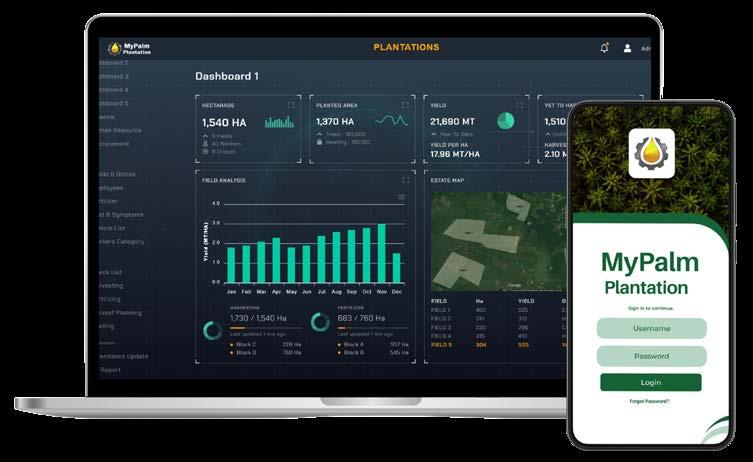
ASIA PALM OIL MAGAZINE | Apr-Jun 2024 46 TECHNOLOGY AND PRODUCT NEWS
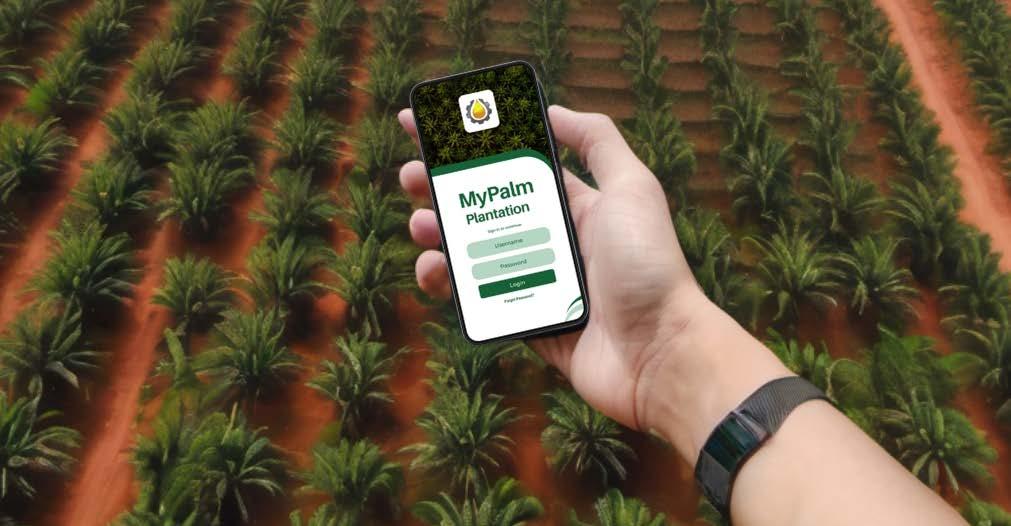
Empowering Transformation with MyPalm
MyPalm Plantation, a groundbreaking solution developed by AIREI Sdn. Bhd., aims to revolutionise oil palm management practices and usher in a new era of efficiency and sustainability. MyPalm Plantation focuses on transforming oil palm plantations into efficient, digitised processes across various aspects, including operations, maintenance, human resources management, stores inventory, and accounting processes. This innovative cloud-based platform, accessible via web and mobile applications, harnesses the power of Artificial Intelligence (AI) to address challenges faced by oil palm plantations.
MyPalm's Solutions for Modern Agricultural Challenges
MyPalm Plantation presents a comprehensive solution tailored to address the challenges faced by oil palm plantations today. With its key modules and features designed to optimise various aspects of plantation management, MyPalm Plantation aims to revolutionise management of operations in oil palm plantation.
The Operations Module is at the forefront, managing crucial tasks such as harvesting, pruning and weeding. By ensuring timely execution and progress tracking, this module addresses inefficiencies in manual processes, thus enhancing productivity. Moreover, automated notifications facilitate seamless communication and coordination among workers, further boosting efficiency across the plantation.

ASIA PALM OIL MAGAZINE | Apr-Jun 2024
The Human Resources (HR) Module introduces cutting-edge solutions for attendance tracking and payroll processing. A distinctive feature of this HR Module is the remote attendance recording through the Geo-Fencing Feature. It efficiently captures user attendance remotely by employing fingerprint and face recognition directly from the site, eliminating the necessity to physically be present in the office. This innovative approach guarantees precision and real-time location data, doing away with the reliance on traditional attendance methods. Workers can effortlessly report their attendance from the site, sparing them the need to visit the office. The attendance records seamlessly integrate with payroll processing, facilitating automated calculations and ensuring timely salary disbursements. This not only streamlines payroll procedures but also reduces administrative burdens, contributing to an overall enhancement in efficiency.
The Store Module streamlines the entire inventory and procurement process, minimising paperwork and simplifying operations. From requisition to order placement, this module ensures efficient management and optimal resource allocation through real-time stock tracking. By transitioning to a digital inventory management system, MyPalm Plantation effectively addresses challenges associated with inventory inaccuracies and resource wastage, thus promoting cost-effectiveness and sustainability.
Lastly, the Accounting Module facilitates real-time financial transactions and reporting, furnishing managers with autogenerated reports for advanced analysis and decision-making. By providing insights into financial performance and resource utilisation, this module empowers informed decision-making, driving sustainable growth and profitability.

ASIA PALM OIL MAGAZINE | Apr-Jun 2024 48
TECHNOLOGY AND PRODUCT NEWS

The AI Advantage, Dashboard Brilliance, and Network Resilience
Incorporating cutting-edge technology, MyPalm Plantation offers unparalleled efficiency and productivity enhancements. Leveraging AI, MyPalm provides predictions for yield projections, focusing on various operational parameters. By analysing data from these crucial aspects of plantation management, MyPalm utilises AI algorithms to forecast output production with remarkable accuracy. This empowers managers to make proactive decisions regarding resource allocation and operational planning, ultimately optimising productivity and maximising yield. Furthermore, MyPalm is tailored for deployment in remote and inaccessible regions within the plantation. The application features an offline mode, vital for areas with limited network coverage, guaranteeing uninterrupted functionality in challenging environments. When connectivity is restored at site offices, data synchronisation with servers occurs automatically, facilitating instant information transfer. This streamlined process eliminates the laborious task of manual compilation, which traditionally consumes significant time and effort.
Additionally, MyPalm offers a unified dashboard accessible through both web and mobile applications, facilitating seamless monitoring of plantation operations. Operational users benefit from the convenience of a dedicated mobile application, ensuring access to critical information anytime, anywhere.
Unlocking the Future of Oil Palm Management
Embrace the future of oil palm management with MyPalm Plantation. Experience the synergy of AI, technology, innovation, and efficiency, propelling oil palm plantations towards enhanced productivity and sustainability. To embark on this transformative journey, visit www.airei.com.my or scan the QR code below.

ASIA PALM OIL MAGAZINE | Apr-Jun 2024
Nigeria Spends N430bn Annually to Import Palm Oil
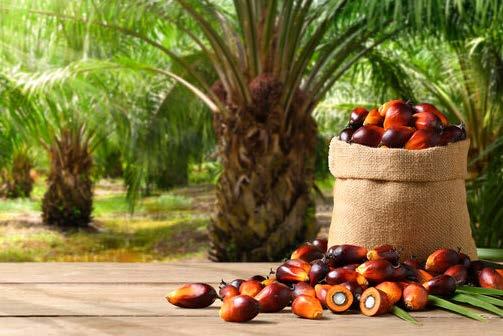

Joe-Onyiuke
In this interview, the president of the Oil Palm Growers Association of Nigeria (OPGAN), Mr Joe Onyiuke, who is a lawyer and entrepreneur, speaks on how the federal government can attain mass employment, food security and stop the $500m (N430 billion at N860/$) spent annually to import palm oil into the country.
1. How has Nigeria, a net producer of palm oil remained an importer?
Governments in the past were not developing small business holders while they developed other sectors that they felt were more organized in the sense that they had collaterals to pick up single-digit and long-term loans and all that.
However, the critical mass that will create employment and generate revenue for the government in terms of taxation and GDP growth was neglected in a way that they began to have numerous problems.
First, they were majorly handicapped in the previous administration and system of the country. Secondly, access to high-quality seed materials has been very low and even almost impossible.
Thirdly, access to funding to acquire modern processing mills to process high-quality products was not available and so they suffered so many post-harvest losses.
Most times, what they produced was below standard because they are using their bare hands and post-harvest losses are so huge. The provision of these facilities could create very big incentives to any farmer because they are major issues.
Also, the inability of our state governors to issue certificates of occupancy for people’s farms remains a huge setback for agricultural development.
When you issue C of O to them, you unlock their potential to have access to funding. This is because there is no financial institution in the country that would not ask for the basics when you request a loan. The socio-economic impact of oil palm is so large that today, our body cream, margarine, butter, mayonnaise, and even vegetable oil, are all bleached palm oil. The pasta, noodles, and biscuits, all these are from palm oil.
ASIA PALM OIL MAGAZINE | Apr-Jun 2024 50
SPECIAL INSIGHT
In fact, the demand for palm oil in food industries is so huge that it has been found in other things including cosmetics, paints, polish, and even pharmaceutical industries. And these are things that will unlock the potential of this country. So, the government should refocus on these three crops.
In the 1960s, we were known for cocoa, oil palm, and rubber. The Chinese and foreign investors were able to come in because of the raw materials that were available in large quantities.
Countries like Thailand, Indonesia and Malaysia used their crude oil resources to develop their own palm oil sector to create widespread employment opportunities and all that. They have policies in place to safeguard local production. You must check your borders to ensure they are not porous.
Look at how much the country has lost in terms of importation. Today, people are importing polished palm oil and vegetable oil in the name of crude palm oil into the country.
2. Do they pay duties for all these bad items?
I hope this new administration will focus properly on cleaning up our system because we cannot allow people to sabotage this economy. We have industries that produce a lot of things from crude palm oil and once you bring the bad oil, you are destroying their businesses.

For instance, our members are not encouraged because nobody is selling. And by the way, Nigerians spend about $500 million every year to import these things because the local demand is so big.
3. What is the government doing?
In the past, attention was given to the big players who controlled only 20 per cent.
But how can you neglect the critical mass? Look at the level of youth unemployment. And this is one sector that has women inclusion majorly in the entire value chain; If the government is able to channel their resources into research.
NIFOR was set up in 1938 by the British known as the West African Institute for Oil Palm Research. Today it is called the Nigerian Institute for Oil Palm Research. We thank God for the executive director who has now renewed that decaying institution to a level that we can say we are proud of.
Before now, it was in a sorry situation but thank God for the new management, which has done a lot of work and our farmers have benefited so much.
In December 2020, we were given a total of 169,000 sprouted nuts as gift from the Ministry of Agriculture which we shared with our members. We looked at how the whole system was in disarray. And we needed to organize our members. We then found out that we had only 24 states in Nigeria recognized by the Ministry of Agriculture as oil-producing states. But we had more than that, up to Taraba and Adamawa state.
So, we went to the minister, and we increased the number to 27 because we went there to make sure we can have oil palm production in other parts of the country so that the country can benefit. We have given back the sprouted nuts to NIFOR to help us raise them to the seedling level because that’s the most critical part of oil palm development.
So, we told NIFOR to help us groom them at a discounted rate. We are certain that before the end of this month, we will organize a town hall meeting to start distribution state by state.
Those seedlings are very expensive, but they have been highly subsidized. Now we are going to do a major distribution; going with NIFOR to teach our members how to take care of the seedless.
ASIA PALM OIL MAGAZINE | Apr-Jun 2024
We need to sensitize our people to go back to farming because that is the future we have in this country to move people out of poverty completely.
Today, one ton of palm oil is about N1 million and so if a man is doing an average of eight to 10 tons on one plantation, he is already a millionaire. And if you sell the fruits to big mills that have the capacity to mill, and they pay you good money, they will have enough money to take care of themselves, their families and even the farms.
Again, we got nutcrackers from the Ministry of Agriculture, 20 in number. That has already been distributed to 20 states.
We are also talking to governors because they hold the key to helping these farmers access funding. We must commend the new governor of Cross Rivers State, he has shown deep understanding, passion and commitment to change the story in the state. But other state governments must take a cue from that. It is not about playing to the gallery, but it is about doing the critical work.
Nurseries are very key because without them you cannot have those certified seedlings. The problem we have today is that our trees were planted in the 60s, apart from the wide grooves. There must be a very systematic plan to replant the whole entire plantations of these wide grooves and semi-wide grooves.
And those plantations that are already very old have to be replanted. You can imagine that if the $500 million gap that we have is taken out, we would have enough money to meet our needs in the country.
4. Why would a noodles manufacturer in Nigeria rely on imported crude oil palm when it can source it locally?
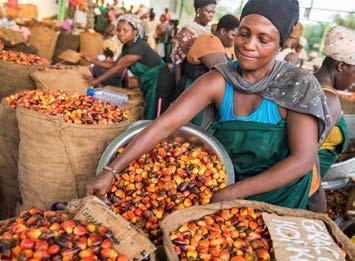
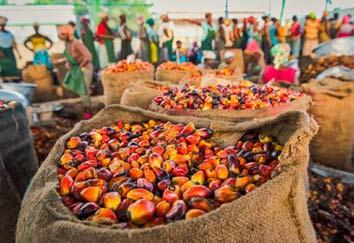
There are two reasons. One is that the supply in the country is lower than demand, so there is a big shortfall; a shortfall of over 500,000 metric tons. So, they have to look outside to remain productive.
If you go to Port Harcourt, our palm kernel shells that were discarded are being shipped out by foreigners.
The oil palm economy can unlock so much potential in this country, more than any other crop. You find palm oil in ice cream and chocolate; many people do not know this. Even in local medicines that you see in the villages, they use the oil to treat people who have seizures.
The gestation period of oil palm is now three years, it used to be about seven years. This means that if you buy a seedling that is two years old, you begin to harvest it in one year. If you buy a one-year-old seedling, you begin to harvest in a maximum of two years.
However, the third year of the life of that sprouted nut, when you begin to harvest, is like when a child is maturing, so it has a very low yield. The fourth year is the main year. So, technically speaking as a farmer, the distance between you and harvesting is three years or two years.
NIFOR seedlings guarantee you eight tons per hectare when it begins full yield. Then it can go up to 25 tons. If you are able to adopt the best management practice, you can do up to 3035 tons per hectare. So, if a farmer has 100 hectares, you are a multi–billionaire.
Our farmers have no business with poverty if only we can key into the system and do this business very well.
ASIA PALM OIL MAGAZINE | Apr-Jun 2024 52
SPECIAL INSIGHT

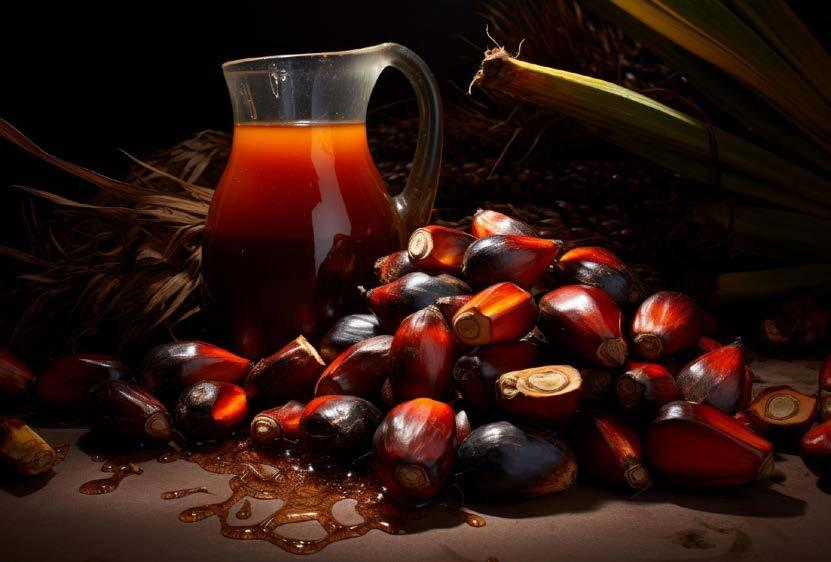
My Say: Using Palm Oil Residue for Fuel and Feed Makes Green Sense
Living in Malaysia, one can’t help but be aware of our golden oil crop, palm oil. It is literally everywhere, which got me thinking about whether we could use its residue to support our national efforts around energy and food security. The results were surprisingly positive. Sounds too good to be true? Here’s the story.
Palm oil is extracted from the flesh or outer part of the fruit. From the palm fruit seed or kernel, palm kernel oil is extracted. Both are useful materials, with palm oil traditionally used for edible purposes such as cooking and frying, whereas palm kernel oil is for non-edible purposes such as the formulation of soap, cosmetics and detergent. The residue that remains — tonnes of it — is known as palm kernel cake (PKC). It is estimated that Southeast Asia produces close to nine million tonnes per year, with 90% being exported as low-cost waste for cattle fodder in far-off markets including New Zealand, South Korea and Europe.
Now, new fermentation technology, using patented industrial biotechnology, can break down the fibers in PKC to produce ethanol that can be used as a blend in normal fuel or as a raw material for aviation fuel. Since PKC is a processing residue and a non-food source, it could well become a suitable feedstock for sustainable aviation fuel, commonly known as SAF. The global market for SAF is estimated to be close to US$1 billion (RM4.7 billion) in 2024, and rising to US$33 billion by 2032 as airlines are mandated to use a more sustainable fuel.
Currently, SAF producers rely on waste cooking oil as their raw material. That’s right, the stuff you throw down the drain. If collected at scale, waste oil can be processed into aviation fuel, and since it is produced from waste, then it is considered sustainable. Similarly, the waste oil from palm effluent is increasingly being aggregated for SAF, hence, preventing it from ending up in our rivers. This is hugely positive for Malaysia but may not by itself be sufficient to satisfy future SAF demand.
ASIA PALM OIL MAGAZINE | Apr-Jun 2024 54 SPECIAL INSIGHT
Malaysia would be better positioned to become a regional SAF production hub if it could supplement its waste oil feedstock with residue like PKC. Once the production hubs are built, we could move on to next-generation biomass (cellulosic) feedstock that is abundant, resulting perhaps in cost leadership for SAF. The National Biomass Action Plan 2023 already describes the setting up of biomass aggregation hubs. Having said that, a Boeing sponsored study looking into suitable feedstock in Southeast Asia for SAF, doesn’t even have PKC on its radar screen, so the opportunity may well pass us by.
It now gets even more interesting because a co-product from turning PKC into SAF is a protein-rich material that can be used as poultry (chicken) feed to replace imported corn and soybean. Malaysia is one of the most dependent countries in Southeast Asia on imported animal feed. In 2022, we imported more than five million tonnes of corn and soybean products from countries like Brazil and Argentina for poultry and other livestock.
The demand elsewhere in Southeast Asia is also very high, with more than 20 million tonnes per year of soybean and
other protein meals being imported. Population growth and increasing consumption per capita, associated with higher incomes, will push up demand by 20% within the next 10 years.
Imports are likely to be compounded by trade complexity, with currency depreciation and delays due to wars spiking prices overnight. It is expected to be further exacerbated due to climate change-induced challenges to food security, with drought, wildfires and extreme weather events affecting some of the world’s biggest crop-producing countries. If we don’t act to lower import costs, the day will come that chicken will be a luxury product!
Furthermore, an early start in large-scale biotechnologies will build the expertise and talent in the nascent industry. If we take a lead, Malaysia could be a base for other bio-based products, creating multiple spillover effects and attracting other industrial biotechnology industries to set up in the country using our raw materials and expertise. We already have good examples of creating these ecosystems with the electronics industry in Penang and petrochemical industries.

ASIA PALM OIL MAGAZINE | Apr-Jun 2024
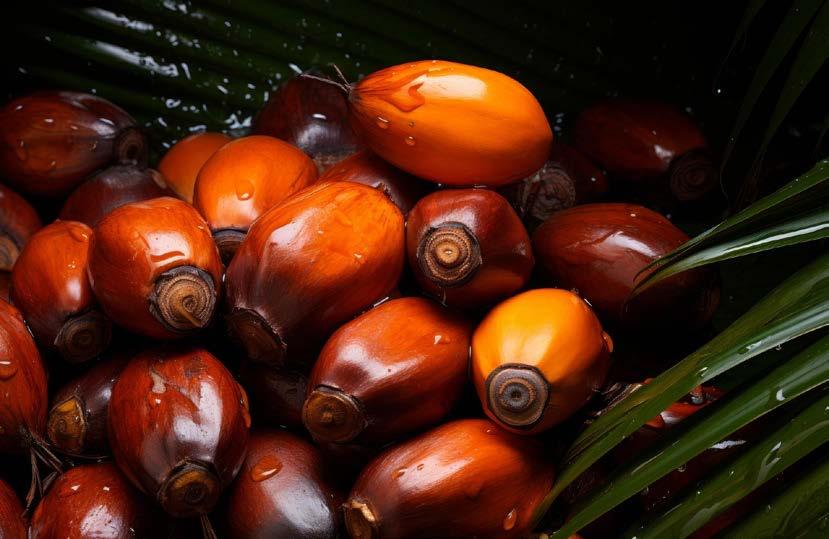
So, what’s the barrier?
It’s not technology. The technology is well known and is already being used to convert other crops such as corn, wheat, rice and even tapioca into ethanol. The technology is promising, and our own Ministry of Science Technology and Innovation (Mosti) has examined and verified that the technology can have a positive benefit for the country.
Why then, have we not built PKC biorefineries in Malaysia? Even positive change comes with risk, and creating something new needs supporters and the right environment to succeed. The bigger the scale, the bigger the benefits for Malaysia, but also the bigger the cost. A small processing factory will cost around US$20 million, and a large factory can cost up to US$100 million to process 250,000 tonnes of PKC per year. Climate-related and impact funds can play an important role by offering lower cost financing to jump-start the industry. But investors with deep pockets also need to step up to take the risks that come with launching a new industry.
Our neighbor, Indonesia, is in the process of launching its first plant. It has shown the appetite to take on the risks and is well placed to harvest the rewards. Unfortunately, in Malaysia, similar players seem to priorities segments that they already know well.
Malaysia stands a chance to manage volatile chicken and egg costs by reducing its dependence on imported feed, while becoming the world’s epicenter of SAF. Not only can it be an affordable and secure source of protein for the country’s growing population, but the green fuel could be a huge financial and environmental advantage for our airline companies, not to mention our airports (stop in Kuala Lumpur to fill up!). More stops in KL will trigger more tourism, giving the country yet another boost.
Malaysia badly needs a “win” and my guess is this is it.
Having taken a break from running a media company, Premesh Chandran is looking at how Malaysia can better prepare for the decades ahead. He can be reached via LinkedIn.
ASIA PALM OIL MAGAZINE | Apr-Jun 2024 56
SPECIAL INSIGHT
Source: theedgemalaysia.com





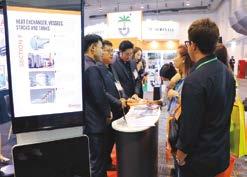




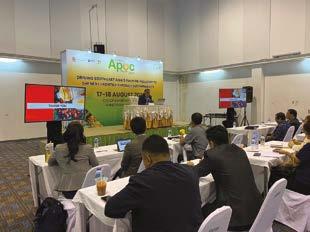








www.thaipalmoil.com FOR MORE INFORMATION info@fireworksthai.com (+66) 2 513 1418 #PALMEXTHAILAND Asia Palm Oil Magazine OFFICIAL MEDIA JuzTalk Thailand CONFERENCE BY Thai Oil Palm & Palm Oil Association HOSTED BY ENDORSED BY Thai Palm Oil Refinery Association Thai Palm Oil Crushing Mill Association Asia Palm Oil Technology Association Thai Biodiesel Producer Association Hotline Number : (+66) 88 972 0868 Incorporating: 2024 THAILAND’S LARGEST PALM OIL TECHNOLOGY EVENT! SURATTHANI, THAILAND 1-2 AUGUST 2024 PALMEX THAILAND 2024

COVID-19 Remembered: The Oil Palm Business Continuity
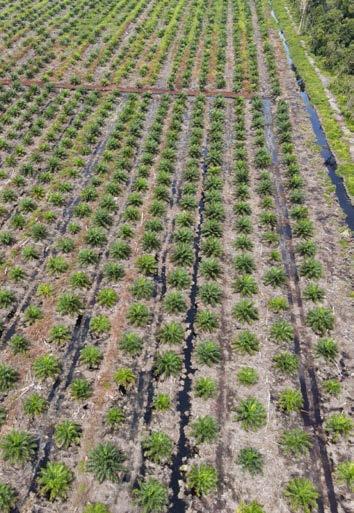
In March 2020, Malaysia confronted the onset of COVID-19 pandemic, prompting the imposition of a nationwide movement control order (MCO) to curb the virus’s spread.
Subsequent waves of restrictions, including the Conditional MCO and the Recovery MCO, followed.
However, events such as the Sabah state election and factory outbreaks triggered further waves of infections, leading to reinstated restrictions and eventually a nationwide MCO and “total lockdown” due to the Delta variant.
Despite vaccination efforts and plans to transition to endemic status by October 2021, a fifth wave emerged in 2022, driven by the Omicron variant.
Nevertheless, the vaccination programme made significant progress by inoculating over 80% of the population and 97% of adults by April 2022.
While the sacrifices of the frontline warriors remain paramount in our hearts and minds, it is also vital to recall the pivotal role played by the oil palm sector in upholding global food security, sustaining employment opportunities and nurturing public health.
Many may not be aware of the advocacy lobbying for the oil palm sector to be placed as an essential economic sector; or the shutdown of the sector in Sabah and the calamity after Sabah State Election.
The key advocates for the oil palm sector during the pandemic include Datuk Nageeb Wahab of the Malaysian Palm Oil Association (MPOA), Jeffery Ong and the undersigned of Malaysian Estate Owners’ Association (MEOA).
The recent Maybank Investment Bank’s Plantation Report, authored by Ong Chee Ting, sheds light on the significant contributions of the plantation sector during Covid-19.
Despite facing challenges such as soaring costs and declining productivity, the sector remained resilient, channeling over RM23 billion into government coffers through various taxes and levies between 2020-2023.
This included contributions from windfall profit levy, export duties, Malaysian Palm Oil Board (MPOB) cess, Sabah and Sarawak sales taxes and corporate and individual taxes, making it among the highest tax contributors to government coffers.
These funds were crucial for supporting initiatives like free COVID vaccinations and cash handouts.
Palm oil, the primary product of the sector, played a crucial role in maintaining stability during the pandemic, with palm kernel oil (PKO) also proving essential in producing sanitizing and cleaning products.
ASIA PALM OIL MAGAZINE | Apr-Jun 2024 58
SPECIAL INSIGHT

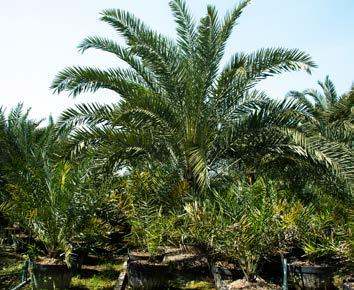
Despite the economic turmoil, the plantation sector provided a sense of stability and support for workers, offering safety measures such as free COVID testing and vaccinations and ensuring a reliable source of income, even for foreign workers supporting their families back home.
During the pandemic, the advocates faced their defining moments when the sector was initially excluded as essential sectors, leading to a one-day shutdown on 18 March 2020.
Through sleepless and tireless efforts and engagement, they successfully lobbied for reclassification, securing continued operations by sustained appealing to the government.
Their perseverance resulted in a conditional exemption, allowing operations to resume on March 19, 2020.
However, over the next two years, they continued to navigate challenges, engaging stakeholders, dispelling misconceptions and garner for planters’ support to aid hospitals and communities.
After overcoming initial obstacles, the plantation industry faced a major setback when the Sabah government announced a shutdown of the oil palm supply chain on March 24, 2020. This decision posed a significant threat to plantation operations in the state.
Advocates mobilized their networks and media to engage with state officials, highlighting the industry’s essential role in Sabah’s economy.
However, the situation worsened after the Sabah State Election.
Campaign activities led to a surge in COVID-19 cases due to inadequate compliance with safety protocols.
During the pandemic, associations collaborated to enforce strict safety measures across the supply chain.
They issued united statements emphasizing their commitment to safety during the MCO. Planters took proactive steps to develop COVID-19 standard operating procedures (SOPs), with notable contributions from entities like MEOA and IJM Plantations Bhd.
These SOPs were tailored to address the different challenges of the palm oil supply chain and later were shared globally through the Council of Palm Oil Producing Countries (CPOPC) to Indonesia and Costa Rica. The overarching goal was to ensure the continuous plantation operations under stringent safety measures.
Amid the COVID-19 pandemic, the oil palm industry faced a critical moment when the Sabah state imposed a bold shutdown of the oil palm supply chain. Initially affecting plantations in 3 districts, the shutdown expanded to 6.
Advocates highlighted the unique biological nature of plantations, emphasizing the risks of shut-downs due to potential migration and unrest. They lobbied for the continuation of operations under strict safety measures to protect both public health and the livelihoods of workers.
Eventually, their efforts paid off, with the state government granting permission for operations to resume on 10 April 2020.
However, the planters Sabah faced other challenges due to ambiguous directives and local interpretations.
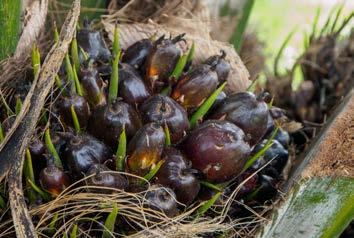
ASIA PALM OIL MAGAZINE | Apr-Jun 2024
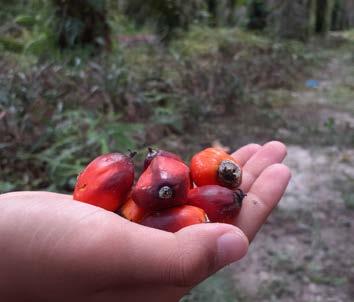
At one juncture, private jetty operations faced closure, highlighting slow decision-making and a lack of understanding of the sector’s supply chain.
Concurrently, meeting environmental and food safety regulations posed further challenges, with deadlines looming amid the MCO and difficulties in importing essential equipment.
In June 2020, a freeze on new foreign worker intake exacerbated labor shortages, despite appeals for exemption and efforts to recruit locals.
During the pandemic, MPOA and MEOA established respective Covid-19 funds with the former collecting RM5mil and used for procuring medical equipment and supplies for hospitals in Peninsular Malaysia.
Overcoming logistical challenges, MEOA coordinated mercy flights to transport medical supplies to Sabah. Additionally, planters played a vital role in vaccination efforts.
In Peninsular Malaysia, the MPIC-MPOA Vaccination Programme began.
In Sarawak, Sarawak Oil Palm Plantation Owners Association (SOPPOA) and Sime Darby Plantation Bhd collaborated with SDMC to establish the state’s first public-private partnership vaccination centers.
MEOA collaborated with Earth Heir to produce medical PPE equipment for hospitals and funded a vaccination center in Sandakan.
In rural Sabah, addressing vaccination challenges for migrants and their dependents was imperative. Stakeholders convened at an IJM retreat site, Hundred Acre Wood where discussions led to the establishment of Pusat Pemberian Vaksin (PPVs) in estates, starting with IJM Plantations in Sandakan.
The plantation support, including cold storage facilities and logistics, ensured a successful partnership and extended benefits to rural communities. More PPVs were subsequently established in estates, and by September 2021, vaccination initiatives were extended to youths aged 12-17, bolstering efforts for herd immunity. Mobile vaccination units and in situ PPVs became models for expanding vaccination coverage, mitigating risks associated with workers and villagers traveling to urban PPVs.
Throughout 2020-2022, the oil palm sector faced significant challenges due to the COVID-19.
Operations gradually returned to normal, but the acute shortage of foreign workers severely impacted yield, causing Malaysia to lose an estimated RM20bil in revenue in 2022.
By Feb 10, 2023, Malaysia had recorded over 5 million confirmed COVID-19 cases, with approximately 323,000 active cases and nearly 40,000 deaths.
Industry advocates and planters collaborated closely to navigate legal restrictions and implement innovative solutions, coordinating with government agencies including MPOB and health authorities to establish safety protocols.
Despite the challenges, valuable lessons in crisis management, resilience, and sector-wide solidarity were built.
There is a fervent hope that such pandemics will not recur in the future. Lest we forget.

Joseph
ASIA PALM OIL MAGAZINE | Apr-Jun 2024 60
Source: www.thestar.com.my SPECIAL INSIGHT
Tek Choo Yee is the Malaysian Palm Oil Association chief executive. The views expressed here are the writer’s own.
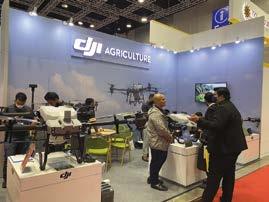








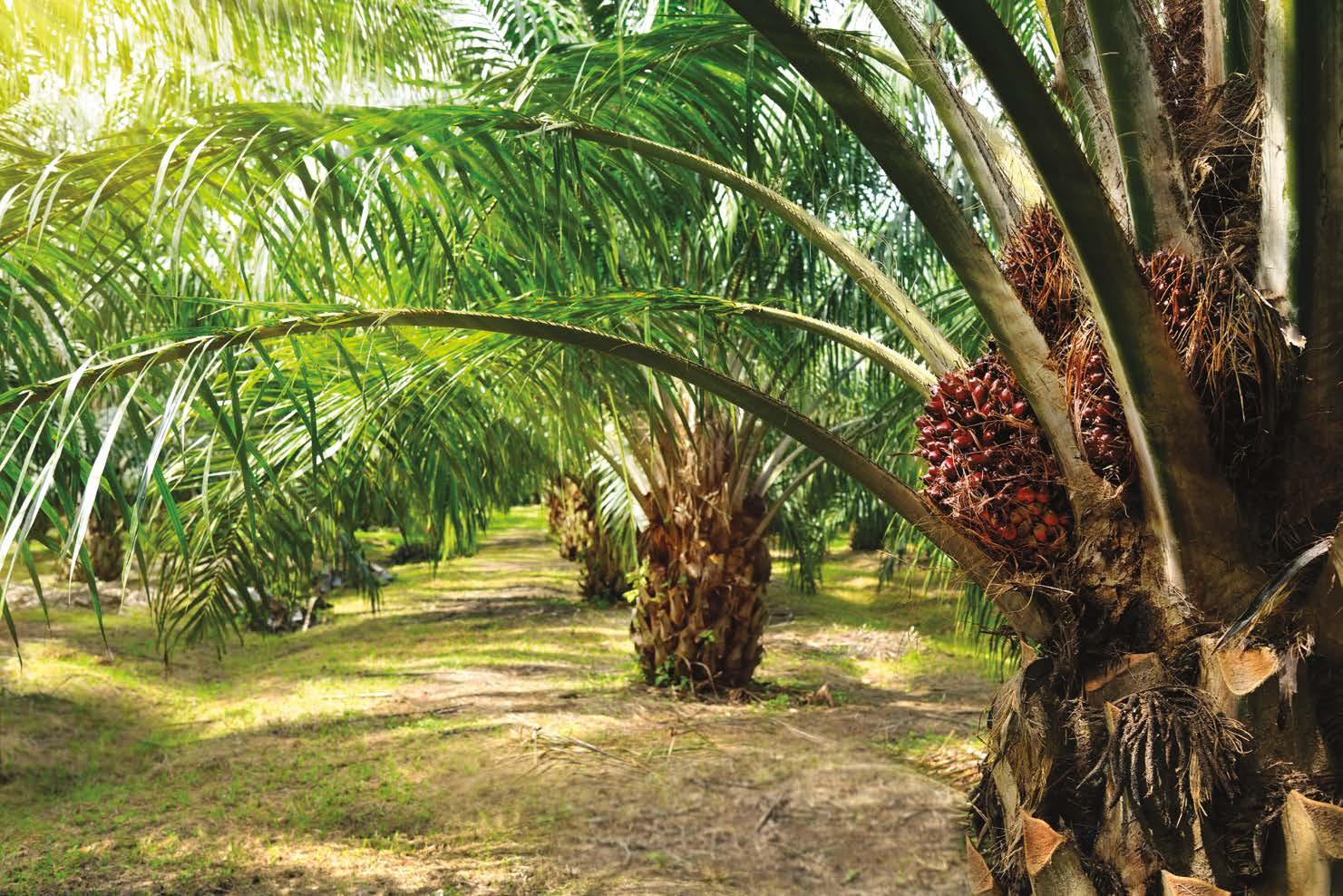
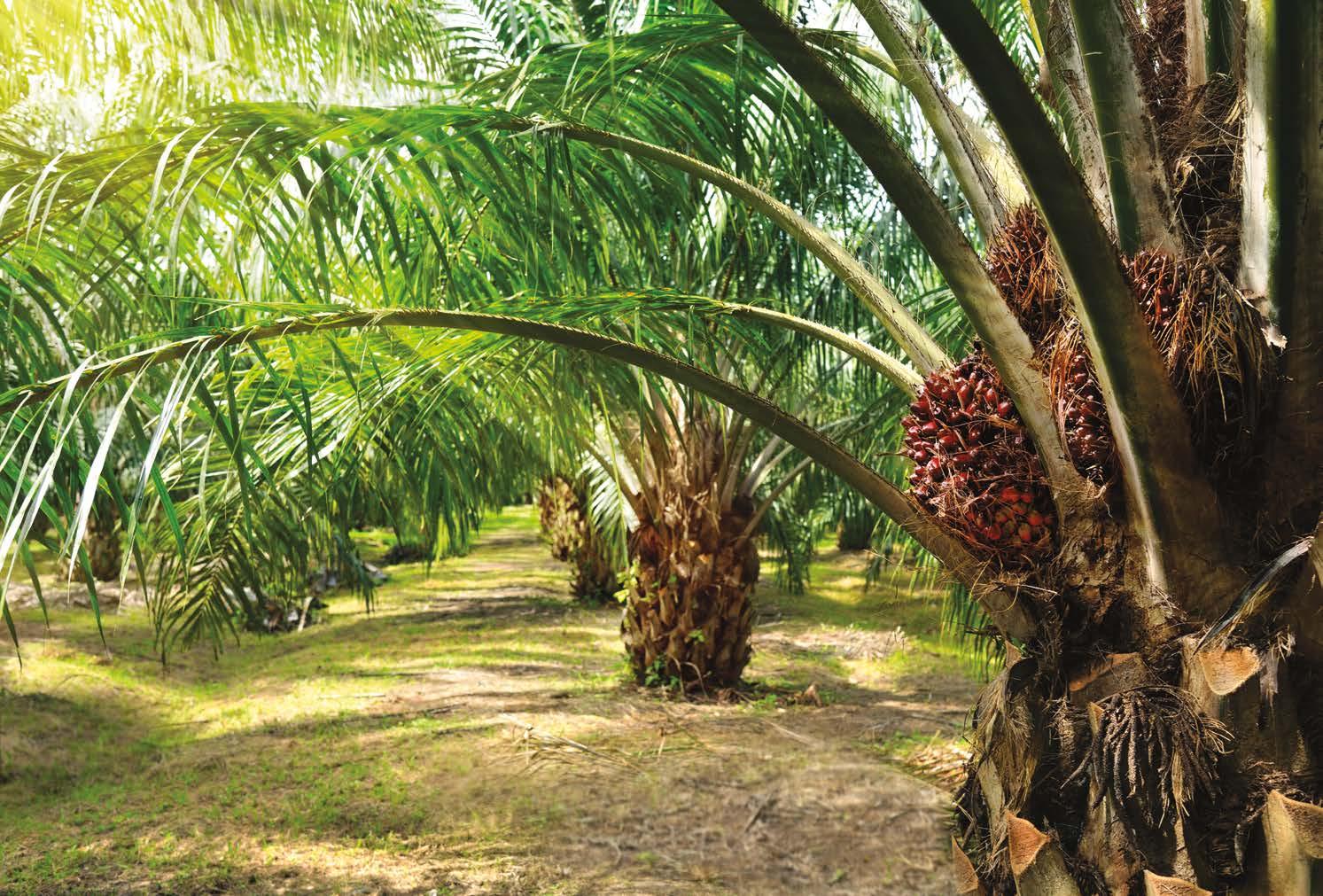



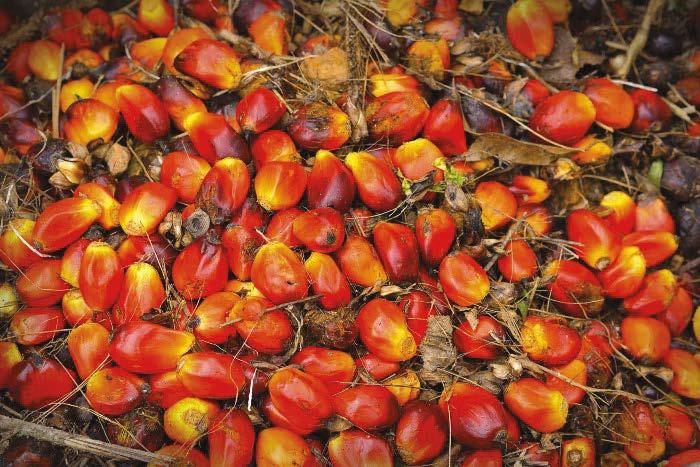


IBG Manufacturing Sdn Bhd
Igus Malaysia Sdn Bhd
JJ-Lurgi Engineering Sdn Bhd


www.agrimalaysia.com
www.elliott-turbo.com
www.haus.com.tr
www.hssip.com
www.ibgv.com.my / www.ibgbiofertilizer.com.my
www.igus-asean.com
www.jj-lurgi.com
www.myandegroup.com
www.antcn.cn
www.palmoilexpo.com
www.asiapalmoil.com
www.thaipalmoil.com
www.hardox.com
www.taner.com.my
www.vc-eng.com
www.maytechcr.com
www.wascoenergy.com
www.yklgroup.com.my


Page 25 33 29 35 41 23 9 13 IBC 37 39 61 57 31 5 53/ Cover Bottom 21 3/ IFC/ OBC Advertisers ABS Innovations Sdn Bhd Agri Malaysia 2024 Elliott Group
HA-US Santrifuj Teknolojileri San. Tic. Ltd. Sti.
HSS Industrial Products Sdn Bhd
Machinery
PALMEX Indonesia 2024 PALMEX Malaysia 2024 PALMEX Thailand 2024 SSAB Swedish Steel Sdn Bhd Taner Industrial Technology (M) Sdn Bhd VC Engineering Sdn. Bhd.
Agrotech Sdn Bhd
Engineering Sdn Bhd
Myande Group Co. Ltd Nantong Ant
Co. Ltd
Wasco
YKL
Website absi.global
INTERNATIONAL SALES
E-mail: my@asiafbi.com E-mail: info@fireworkssg.com E-mail: info@fireworksid.com E-mail: info@fireworkphils.com
OFFICES ADVERTISERS INDEX
